ANNUAL REPORT 2022–2023


WALKING WITH ABORIGINAL AND TORRES STRAIT ISLANDER PEOPLE
Acknowledgement of Country
Hume Community Housing acknowledges Aboriginal and Torres Strait Islander people as the Traditional Custodians of this land including Dharawal, Cabrogal, Wonnarua, Worimi and Awabakal peoples and the Dharug Nation whose lands Hume operates within. We pay our deep respect to the Elders past, present and emerging and acknowledge their continuing connection and contribution to the lands and waters.
Artwork
In 2021, Hunter artist and proud Gomeroi man, Jakeob Watson, was commissioned by Hume to produce this beautiful artwork. It hangs in our Maitland office.
Reconciliation Action Plan
Hume has successfully completed our Reflect Reconciliation Action Plan (RAP). We recently delivered our Innovate RAP 2023–25. We are eager to work with our NSW communities ‘to empower and build social and financial equality’ for Aboriginal and Torres Strait Islander people.
Read our Innovate Reconciliation Action Plan on our website at humehousing.com.au
Chair’s letter .................................................................................................................... 2 Message from the CEO ................................................................................................ 3 About us 5 Our strategy 9 Our homes ..................................................................................................................... 12 Our customers............................................................................................................... 14 Our operating environment ....................................................................................... 16 Our strategic pillars in action 20 Our management and accountability 50 Financial summary ....................................................................................................... 61 Environmental, social & governance reporting ................................................... 63 Our partners 72 Glossary & abbreviations 74 Contact us ..................................................................................................... Back cover 1
CONTENTS
CHAIR’S LETTER
Welcome to Hume Community Housing’s Annual Report 2022–2023. This will be my last report as I will soon be stepping down after two years in the Chair and almost 10 years serving on Hume’s Board.
As a passionate advocate for safe, secure and affordable housing, it is a bittersweet time to be leaving. Safe housing is a human right and right now there is a clear call from the Australian community, demanding that our housing affordability crisis be urgently addressed. The imperative for Community Housing Providers like us to deliver cost-effective social and affordable housing solutions at scale has never been more important.
In 2022–23 Hume has made incredible progress on many initiatives:
⊲ Building and development credentials and capability: Hume has focused on building the expertise and proven capacity to manage small through to large scale developments. We have demonstrated our ability to manage sector-leading growth programs, such as our move to the Hunter and Port Stevens regions, and we are building a new development pipeline to meet the urgent need for social and affordable housing.
⊲ Social Impact leadership: Hume is a sector leader in identifying and delivering measurable, cost-effective social impact outcomes and solutions. We provide government and communities with the confidence that Hume can deliver a cost benefit to both individuals and society.
⊲ Customer Experience: We have been building a new customer experience focus for all our services and this is beginning to pay dividends. In particular, maintenance issues will continue to be a high priority.
⊲ Strong contemporary governance and compliance backbone: Our proven commerciality and business acumen enable us to successfully achieve growth and social impact targets. Hume continues to build inhouse expertise and to bring our systems into best practice technology.
We farewelled Nicola Lemon, who resigned after 15 years as CEO. Her vision and passion for creating housing opportunities so people can prosper was key to Hume’s success over that time. My sincere thanks to her for her outstanding contribution to Hume.

Her successor Brad Braithwaite is a wellrespected business leader with proven business and entrepreneurial acumen established over a 20+ year executive career – most recently as Deputy CEO, Anglicare NSW and ACT. I am confident that his passion for the work Hume does and his desire to continue open communication and collaboration at all levels of the organisation will serve Hume’s employees, stakeholders and customers well. He is already building strong relationships across the sector.
We are at a very important crossroads in Australia. We must act now if we want to solve our housing crisis, or risk it becoming a long-term, polarising social problem. Hume has a vital role to play in working with governments and financial institutions to build housing so our customers can enjoy the stability it brings and take control of their futures.
I have been fortunate to be a part of Hume. Hundreds of individuals and families have transformed their lives, communities have been improved and brought closer together, and socially minded businesses are choosing to work with us as partners in this incredible challenge. These achievements and relationships are the future Hume is committed to.
It has been a privilege to work alongside so many talented and passionate people. I’m proud of the numerous initiatives we’ve achieved over this year. But, of course, there is always more to do. I am confident I am leaving Hume in the best possible position to take on those challenges ahead.
 Sue Holliday Chair
Sue Holliday Chair
2
MESSAGE FROM THE CEO
It’s an exciting time to be at Hume! Since arriving in May, I’ve spent much time listening to and learning from our people, customers and stakeholders about the sort of place Hume is and our hopes for the future.
These conversations reaffirm my early observations that Hume is a wonderful organisation with a proud history and very bright future.
Creating ‘Homes and Opportunities’
I was initially attracted to Hume by its purpose: Hume not only builds and manages houses –it creates ‘homes and opportunities’. A wealthy society like Australia has a particular duty to support those experiencing housing insecurity and homelessness. Hume exists precisely because of this belief and is built on its truth: a place to call ‘home’ is the bedrock upon which individual, family and community growth and prosperity are created.
I can’t think of more fulfilling work than what Hume does every day – helping support those in greatest need to access a safe, secure and affordable home. I thank the Board, employees and customers of Hume for trusting me to be CEO of this important effort.
A year of building strong foundations
Our social purpose is at the heart of everything we do, but it must be underpinned by financial strength and stability. That’s why I’m pleased to report a surplus of $5.39 million for the year. It’s even more satisfying to know that every cent Hume makes is reinvested into supporting our existing customers and building more social and affordable homes for the communities we serve. Proof of our commitment to reinvestment is seen in many of the great customer outcomes achieved during the year.
Hume remains an industry leader in sustaining tenancies and supporting customers through periods of financial hardship. Our Housing and Impact team worked side by side with customers as cost-of-living pressures increased, helping them develop support plans and seek additional financial assistance where needed.

Our Assets team had an incredibly busy year, implementing a major property upgrade program in partnership with the NSW Land and Housing Corporation. They delivered substantial improvements to 400+ older properties in our Hunter portfolio in just over four months. Our Chief Operating Officer, Victor Prasad, and the Assets team he oversees, are to be commended for delivering these ambitious works on time and within budget.
This year, we also invested heavily in growing a strong development pipeline. Leveraging Hume’s building and development credentials and capability, our Development Team – ably led by Dan Lincoln – proactively pursued a range of development opportunities that will hopefully bear fruit in the coming year and beyond. Significant grant wins under the NSW Government’s Core and Cluster Domestic Violence Accommodation program and Community Housing Innovation Fund are but a few examples of the team’s early success.
A new season brings new opportunities
A new CEO inevitably brings new perspectives and approaches, but I am also deeply grateful for the legacy I inherited from my predecessor. Nicola Lemon led Hume to become the organisation it is today. As leaders we are only ever temporary stewards and I hope to be as effective in coming years as Nicola was over the past 15.
3
This year, Australia’s housing crisis finally hit the headlines in earnest, capturing the attention of the whole nation. Housing unaffordability and the cost of living have reached record highs and –as is so often the case – those least able to cope financially are worst affected. In response to the crisis, the Federal Government set out its initial plans, via the Housing Accord and the Housing Australia Future Fund (HAFF). Across Australia, state, territory and local governments have been called to act. As the popular Chinese proverb says, ‘with every crisis comes opportunity’. Hume is ready to embrace this once in a generation chance for growth and change.
Hume is ready, agile and responsive to market conditions
As one of the largest and most respected community housing organisations in Australia, Hume is well positioned to create more homes and opportunities for the people we serve. We are experienced builders and developers of new properties, in partnership with government, investors and commercial partners. We have a long and successful track record of delivering large-scale developments. We also pride ourselves on being one of only a few community housing organisations in Australia capable of delivering the full suite of social and affordable rental housing options and support solutions in-house.
In the year ahead we will continue pursuing our strategy to develop a healthy pipeline of new social and affordable homes, maximising our access to HAFF in collaboration with government and commercial partners. We’ll also focus significant attention and investment on pursuing our Business Transformation agenda. This will both assist us to scale up, and free up our people to spend more time focusing on their relationships with our customers, supporting them to live more prosperous lives.
Acknowledgements
An organisation like Hume cannot enjoy the success we have, without the dedication and hard work of many amazing people. I acknowledge and thank all of Hume’s employees and stakeholders for their ongoing support.
A big thanks to Hume’s Board for its support and strategic guidance as I transitioned into the CEO role. In particular, I express my deep gratitude to Hume’s outgoing Chair, Sue Holliday, for her wonderful contribution to Hume over the past decade. Sue is a passionate and widely respected advocate for social and affordable housing and has been a driving force behind Hume’s customer-centric approach. She has also been a constant voice on the need to consider the impact of climate change across Hume’s portfolio. It has been an honour and a privilege to work with her during this important period of leadership change. We are all deeply grateful for the immense legacy Sue leaves.
I would also like to thank Sean Parker and Victor Prasad for their ongoing assistance and advice as part of the executive team. Their support has been invaluable as we work to chart the organisation’s future course. I cannot wait to see what we can achieve together.
Hume’s future is bright!
Looking back on the year that was, we can take great pride in Hume’s achievements. We have done much to develop a solid platform for the year to come. Despite a challenging macroeconomic context and evolving political environment, we are well positioned to take advantage of the many opportunities in front of us. Indeed, we can be optimistic that Hume is heading towards an even brighter future – with an ever greater role in ‘creating homes and opportunities’ for the communities we serve.
Sincerely
 Brad Braithwaite Chief Executive Officer
Brad Braithwaite Chief Executive Officer
4
ABOUT US
OUR VALUES
Builders of resilience
We always step up to a challenge and commit to making a positive impact. We strive for balance and perspective.
Champions of change
We advocate for those who are marginalised and seek to create freedom through choice. We drive continuous improvement and inspire others to action and change.
Determined to succeed
We do what is right to deliver positive social, environmental and financial outcomes that get results. We rigorously deliver value for money by being resourceful, dynamic and efficient.
Creators of connectivity
We are passionate about people, families and communities and seek to bring people together. We support and encourage diversity, community empowerment, social justice and social inclusion.
Who we are
⊲ One of Australia’s largest suppliers of community rental housing – Tier 1
⊲ We own, lease and manage homes across 27 Greater Sydney local government areas (LGAs), the Hunter and other regions of NSW – we are ready to grow
⊲ Close to 30+ years of strong community links and established relationships support our work
⊲ One in every thousand NSW residents’ lives in a Hume property – close to 9,000 customers use our tenancies and services
⊲ Managed the largest government social housing property transfer in Australian history
⊲ Offer every aspect of property and asset management and maintenance services across our portfolio – housing quality and condition influence customer health and wellbeing
⊲ Deliver value for money for government, investors and commercial partners to build and develop new properties – from small, through to multi-storey residential and precinct developments – we’re a safe pair of hands.
Our purpose
Hume creates opportunities for people to prosper. We do this by:
⊲ developing and providing a wide range of rental housing options
⊲ connecting people with services and supports that contribute to vibrant and connected communities
⊲ supporting customers to maintain their rental tenancies and secure housing stability.
5
We believe a safe, secure and affordable home is a human right and gives people a solid base so they can create a brighter future. Our housing first approach has proven that a stable, secure place to live supports people to access life-changing opportunities.
With government support, Hume provides a full continuum of housing solutions for people:
⊲ on low to moderate incomes
⊲ who are homeless
⊲ at risk of homelessness
⊲ escaping domestic and family violence.
Our network of service support partners delivers access to education and training, employment and wellbeing supports – along with opportunities to build the social and community connections people need. We work alongside each customer to determine their housing options and, once homed, support them to maintain their tenancies and plan for success.
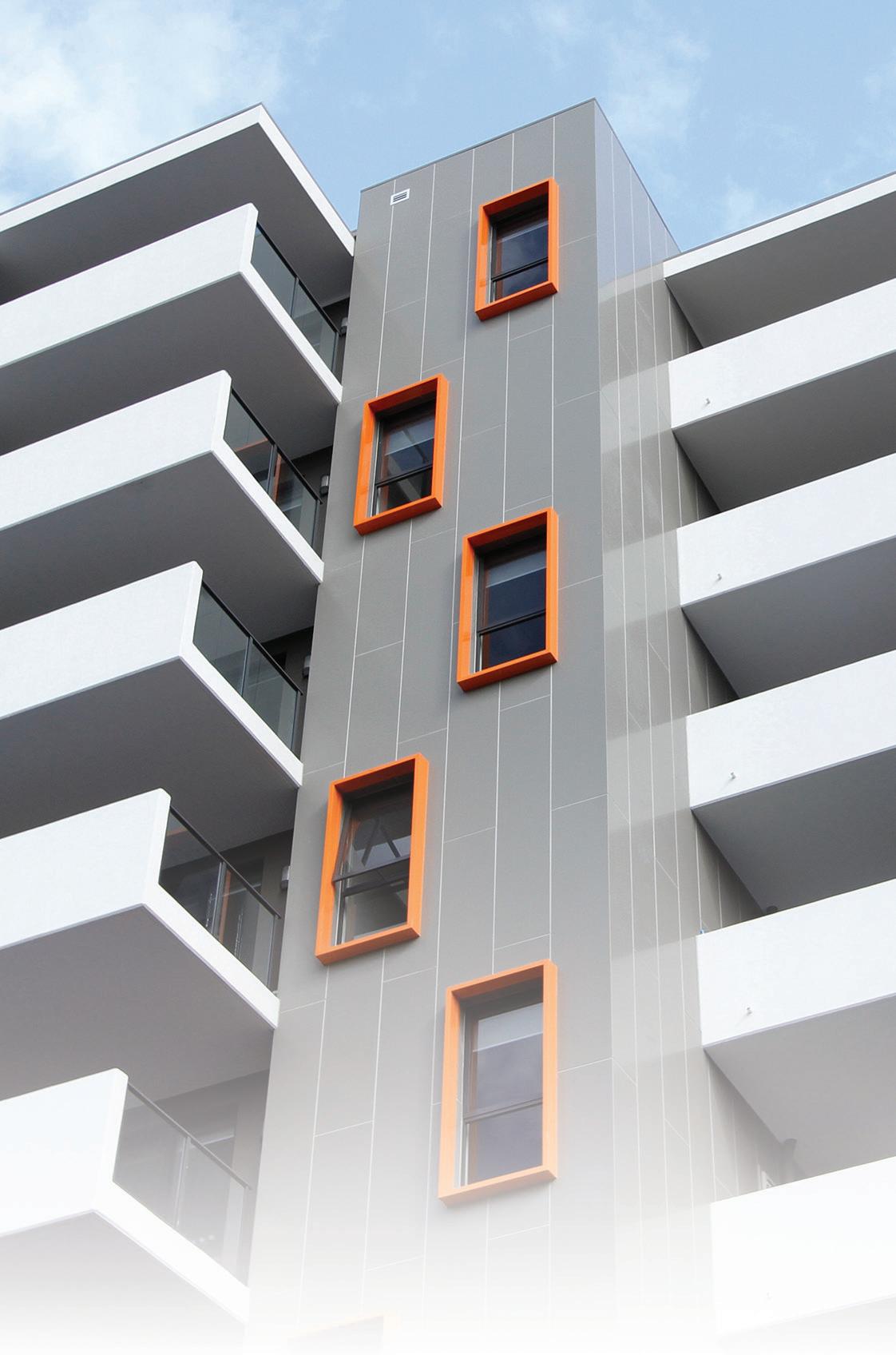

Hume provides a full continuum of housing solutions for people.
6
”
Our housing options



Transitional Housing
Our temporary accommodation and transitional housing programs operate for customers who have been experiencing homelessness and require support in finding a long-term home and demonstrating they are able to sustain a tenancy. Temporary accommodation program offers accommodation up to 28 days and transitional housing up to 18 months.
Social Housing
We provide housing for those on very low to low incomes, and unable to secure affordable or private rentals.
Housing First
A model for housing and supporting people who have experienced long term and reoccurring homelessness and who face a range of complex challenges. Hume’s Housing First model supports strategies to end homelessness and effectively assist some of the most vulnerable people in our community.

Affordable Housing
We provide housing to customers earning low to moderate incomes, particularly essential workers.
Youth Housing
We work in partnership with support services to provide suitable housing for youth between 15 and 24 years.

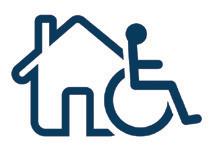


Supported Housing
We work with specialist homelessness services and community service organisations to provide housing.
Housing for People with Disability
We are a registered Specialist Disability Accommodation (SDA) and National Disability Insurance Scheme (NDIS) provider, delivering a range of disability housing services for people that require specialist property design and support.
Seniors’ Housing
We provide housing for people over 55, focusing on outcomes we know are important to them and supporting ageing in place.
Private Rental Assistance
We provide private rental assistance for people in need and eligible for this support to help secure private rental accommodation.
7
HUME HOUSING AT A GLANCE
Our customers
8,699 customers

4,248 properties
4,480 tenancies sustained for 1 year
68.5% of tenancies continuous for ≥6 years
63% of tenants satisfied with the condition of their property
Our organisation

112.9m property portfolio $74.7m operating revenue $17.5m operating EBITDA*
3 offices
155 employees 93% of employees believe in the purpose of the organisation

One in every 1,000 NSW residents lives in a home that is managed by Hume.
* Earnings before interest, taxes, depreciation and amortisation.
8
OUR STRATEGY
Our three strategic pillars create opportunities for people to prosper
Growth
Deepen and consolidate our footprint with a profitable, diversified portfolio. Growth increases the number of people we help prosper.
Growth through partnerships and development
⊲ Core and Cluster development
⊲ East Maitland property accquistion
⊲ $4.2 million capital works completed
Social impact Thriving organisation
Maximise social impact through customer-driven services that change lives.
Design and implement
Hume Outcomes Framework
⊲ Together Home grows to 73 places
⊲ Inaugural Maitland Homelessness Summit
⊲ 761 customers escaped homelessness into temporary accomodation
⊲ Eviction rate of 4%, well under sector average
Deliver value for money through a progressive and high-achieving organisation.
High-achieving organisation
⊲ 100% compliance under National Regulatory Scheme for Community Housing (NRSCH) with zero improvement recommendations
⊲ Data warehouse/ Business Intelligence
⊲ Business Transformation team
⊲ 93% of employees believe in our values
To read about our pillars in action, see pages 20–49.
9
2020
⊲ NSW Government awards $1.1m for Tranche 1 Together Home program.
⊲ 4,143 homes owned or managed.
2018
⊲ Awarded largest social housing management transfer in Australia – 2,000+ properties in the Hunter region.
⊲ Develops 60 units and a corporate head office in Fairfield.
⊲ 2,026 homes owned or managed.
2017
⊲ Registered as SDA provider, NDIS.
⊲ 1,876 homes owned or managed.
2015
⊲ Delivers 21unit seniors’ development, Smithfield.
2019
⊲ First community housing provider to access a NHFIC loan.
⊲ Welcomes 4,000 Hunter customers.
⊲ Opens new offices in Maitland and Raymond Terrace.
2021
⊲ $4m in stimulus funding to upgrade 70 social housing properties in the Hunter.
⊲ Responsibility for maintenance of 2,200 Hunter social housing properties transferred from government to Hume.
⊲ Awarded $1.1m for Tranche 2 Together Home program.
⊲ 4,720 homes owned or managed.
22–23
⊲ Plans for $13m+ development of 12 social and 11 affordable apartments in Liverpool.
⊲ Secures $1.3m for Tranche 3 Together Home program.
⊲ $5m from the CHIF.
⊲ 4,248 homes owned or managed.
1996
⊲ 308 homes owned or managed.
1995
⊲ First customer satisfaction survey.
1994
⊲ Hume Community Housing is born when Fairfield Rental Housing Company and Liverpool Rental Housing Association combine.
⊲ 125 homes owned or managed.
2014
⊲ Launches Telopea Community Centre.
⊲ 1,717 homes owned or managed.
2013
⊲ NRAS allocations increase to 512.
2012
⊲ Assumes management of 152 housing units, Telopea.
⊲ Opens Claymore office.
OUR JOURNEY 1994–2023
2011
⊲ Secures 260 national rental incentives through the NRAS.
2009
⊲ Secures Tier 1 status under NRSCH. Part of the Housing Pathways wait list pilot program.
2008
⊲ First transitional housing program.
2005
⊲ Expands to Fairfield office.
2006
⊲ Launches TAP –partnership with NSW Government.
⊲ 1,338 homes owned or managed.
1998
⊲ Relocates to larger office at The Crescent, Fairfield.
1999
⊲ NCH Standards –3-year accreditation.
⊲ 500 homes owned or managed.
2000
2004
⊲ Celebrates 21 years in community housing and a decade as a CHP.
⊲ 1,006 homes owned or managed.
2003
⊲ Wins first tender.
⊲ Highly Commended –National Award for Excellence in Community Housing.
10
What makes Hume different?
⊲ Hume is a leading Tier 1 community housing provider, delivering a broader range of programs than most, and offering intensive support – we do more than we have to and all that we can.
⊲ We are one of few providers to deliver the full suite of social and affordable rental housing options and support solutions, in-house.
⊲ We tackle complex social challenges and deliver life changing impacts for customers and society.
⊲ Our local-community-informed solutions are effective – we know this because we measure our social impact against a social outcomes framework.

Environmental, social and governance reporting
We aim to provide both a sound commercial return on investment and positive environmental, social and governance (ESG) outcomes. We consider both ESG Reporting Standards for Australian Community Housing and alignment with our own ESG objectives. The symbols below, seen throughout this report, indicate some of our progress.
See pages 63–71 for our detailed ESG report.



Environmental Social Governance
11

Our portfolio is made up of social, supported, affordable and SDA properties
⊲ 278 owned by Hume
⊲ 3,135 managed for Land and Housing Corporation (LAHC)
⊲ 326 managed for other state governments, local governments and private developers/landlords under fee-for-service arrangements
⊲ 22 rental properties secured through real estate agents and private landlords this year.
Property types
1,571 cottages
537 dedicated SDA rooms
277 villas
99 townhouses
1,459 units
608 houses
59 bedsits
12 new properties in 2022–23 31 Albury 47 Wagga Wagga 20 Wollongong 14 Campbelltown 94 Cootamundra 11 Central Coast 57 Cessnock 4 Griffith 16 Wingecarribee 5 Camden 25 Canterbury Bankstown 148 Deniliquin 5 Inner West 20 Georges River 20 Canada Bay 4 The Hills 37 Liverpool 553 Fairfield 675 Cumberland 308 Parramatta 288 Blacktown 105 Penrith 51 Port Stephens 790 Blue Mountains 13 Hawkesbury 5 Maitland 1,418

Secure and affordable housing
3,553 447 480 tenancies (79.3%) dedicated to social housing tenancies (10%) dedicated to affordable housing tenancies (10.7%) Specialist Disability Accommodation
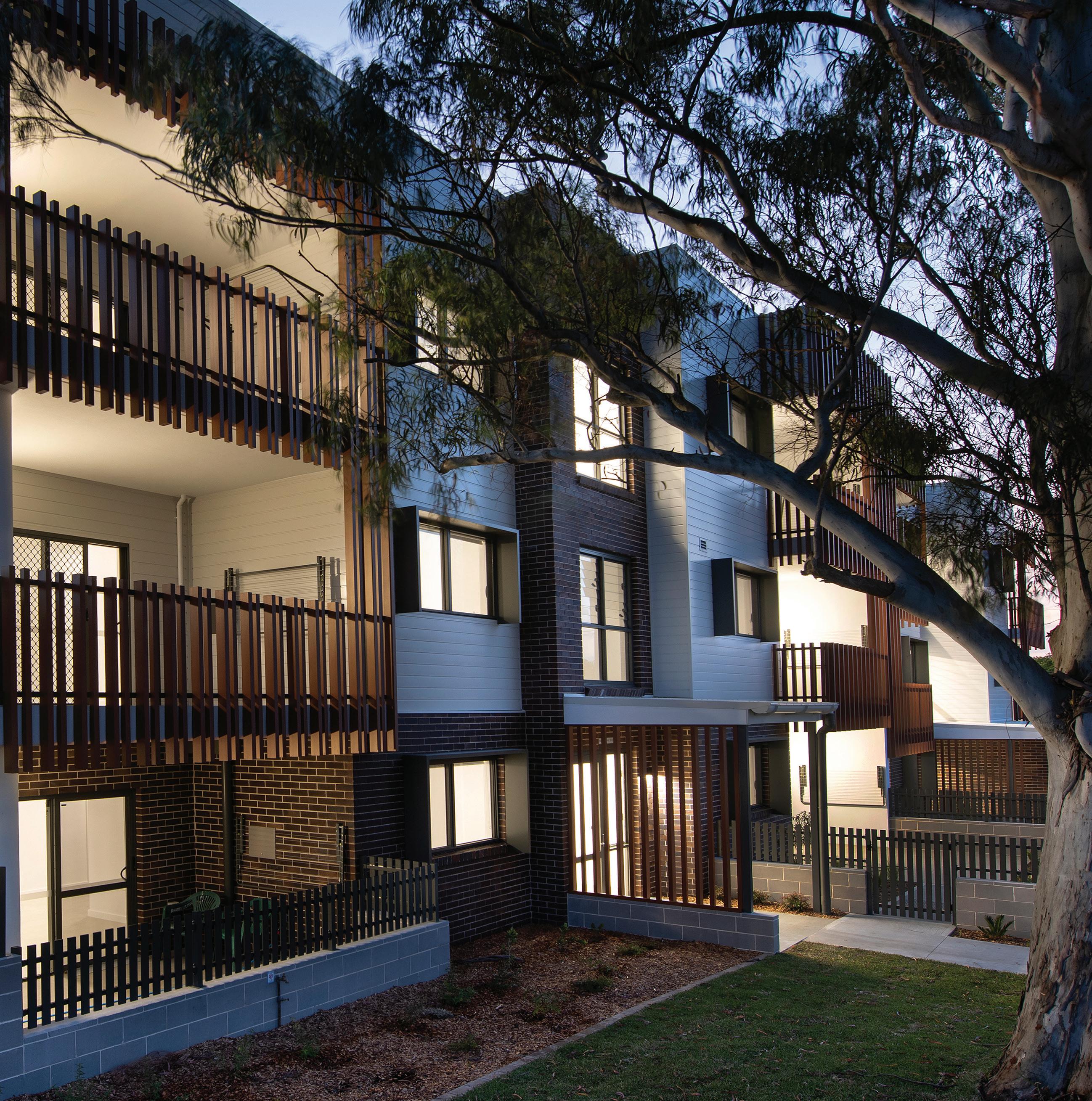
13

8,699 customers
14
OUR CUSTOMERS
18 and under 19–54 55 and over 27% 39% 34% Age range Gender 45% 55%
Demographics
CULTURAL AND LANGUAGE GROUPS
9% Aboriginal and Torres Strait Islander people
83 nationalities represented
76 languages spoken with the top six:
⊲ Arabic
⊲ Vietnamese
⊲ Assyrian
⊲ Spanish
⊲ Kurdish
⊲ Armenian
Tenancies
60% of tenancies are continuous for six years or longer
Length of tenancy


15
≤1 year 2–5 years 6–10 years 15% 25% 25% 21% 14% 11–20 years 20+ years
OUR OPERATING ENVIRONMENT
Hume Community Housing’s footprint spans from the Illawarra region in the south to the Hunter region in the north.
We are an integral supplier of affordable, social housing and SDA to some of NSW’s most disadvantaged regions and communities, including south-western Sydney.
Housing insecurity is a more significant issue than ever, driven by the combination of low incomes, low rental vacancies, spiraling rents and growing cost of living pressures. Our customers struggle to find and maintain stable housing in one of the most expensive housing markets in the world.
Demand for social and affordable housing
Housing is generally considered ‘affordable’ when a person’s housing costs are less than 30% of their gross household income.1
of income to service new rent (25th percentile analysis)
Housing need
NATIONAL
377,600 households currently in housing need

331,100 households in rental stress3
46,500 households experiencing homelessness
NSW
221,500 low-income households with unmet housing needs4
67,000 shortfall of housing in Greater Western Sydney
55,800 people waiting for public housing (7,573 on priority list 5)
1. Based on low to moderate income households.
2. Adapted from Core Logic Housing Affordability Report 2023
3. Rental stress is defined in the State of the Nation’s Housing 2022–23 report as those households in the lowest (poorest) income quintile paying more than 30% of their income in rent (nhfic.gov.au)
4. https://www.facs.nsw.gov.au/download?file=847773
5. https://www.facs.nsw.gov.au/download?file=847772
16
2 48.1 March
March
Sydney Regional NSW 47.6 52.5 56.9
HOUSING STRESS
2020
2023
Portion
Wait times for social housing1
FAIRFIELD
10+ years
3,641 on general list, 207 on priority list
MAITLAND
5–10 years
816 on general waitlist, 101 on priority list
Rental affordability
NATIONAL
345 (0.8%)

rentals affordable for a person on a full-time minimum wage
162 (0.4%)
rentals affordable for a person on the age pension
66 (0.1%)
rentals affordable for a person on a Disability Support pension
4 (0.0%)
rentals affordable for a person on JobSeeker (all share houses)
0 (0.0%)
rentals affordable for a person on Youth Allowance

Housing affordability has declined by almost 14% over a 20-year period and 12.4% over the past decade.3 ”
1. https://www.facs.nsw.gov.au/download?file=847772
2. https://www.anglicare.asn.au/publications/2023-rentalaffordability-snapshot/
3. Core Logic Housing
Affordability Report 2023 17
2
Political climate
Throughout 2022–23, Australia’s housing crisis was never far from the news, with increasing demand for housing, record-low vacancy rates, soaring rentals and rising homelessness. Sydney already has one of the most expensive property markets in the world and with NSW’s population expected to hit 10 million by 2050, demand in Sydney and larger lifestyle locations, including the central coast and Hunter Valley, will only increase.
In recent decades, governments at both state and federal level have relied mainly on free market solutions to Australia’s growing housing problem, such as grants to first home buyers or superannuation incentives to encourage downsizing. Their approach has recently shifted and there are positive signs that the community housing sector will be given a greater role in creating housing for people in need.
Federal government plans include:
⊲ a $10 billion Housing Australia Future Fund (HAFF) to support delivery of 30,000 social and affordable homes in its first five years
⊲ $350 million over five years from 2024–25 to support funding of 10,000 affordable homes under the National Housing Accord (a partnership between all levels of government, institutional investors and the construction sector)
⊲ tax incentives to support build-to-rent developments to reduce barriers to new supply in the private rental market
⊲ increasing the National Housing Finance and Investment Corporation’s (NHFIC’s) liability cap so it can provide more loans to community housing providers for social and affordable housing (~7,000+) dwellings
⊲ the National Housing Infrastructure Facility to make up to $575 million available for immediate investment in social and affordable rental homes
⊲ $67.5 million for states and territories to address homelessness
⊲ a $2 billion Social Housing Accelerator payment to state and territory governments to create thousands of homes for Australians on social housing waiting lists
⊲ a 10 year National Housing and Homelessness Plan – with strategies for how all levels of government can work together, and with the private and community sector, to support people experiencing homelessness and housing insecurity
⊲ a Community Affairs References Committee inquiry into the worsening rental crisis.

18
At the same time, the NSW government is continuing Community Housing Investment Fund (CHIF) programs so community housing providers can deliver more social and affordable housing across NSW, including for women and children experiencing domestic and family violence and people participating in the Together Home Program. It is also removing red tape, with initiatives such as revised planning laws so LAHC and the Aboriginal Housing Office can more easily get approval for projects with more than 75 homes or $30+ million in capital investment.
Under LAHC’s revised direct dealing policy the state government is also supporting more efficient delivery of social housing on government land. Hume welcomes the possibility of redeveloping the housing we currently manage for LAHC, so that it better meets the needs of our customers. This might include much-needed properties for smaller households or people requiring temporary accommodation. Developers are also set to receive planning concessions when they include minimum amounts of affordable housing in their developments, opening up even more possible opportunities for Hume.
When all these government plans and polices are in place, Hume’s track record put us in a very strong position to take advantage of new funding. We are ready to redevelop our existing properties and embrace a pipeline of new social and affordable homes for even more individuals and families, currently on long waiting lists. We are already working with councils, investors and developers to identify opportunities for an immediate start. We are ready to build at scale.
The future is, of course, not without its challenges.
Hume offers many customers a place to call home, but these homes are offered in varying conditions. Inflation continues to rise and the cost of materials, combined with labour shortages mean the cost of upgrades and maintenance is an ongoing challenge. As the impacts of climate change deepen, we will also need to meet customers’ needs for products like air conditioning and renewable energy. Our costs continue to go up.
Currently, many customers require immediate help with the rising cost-of-living. We need more resources to help people find jobs or manage their limited finances, and to offer limited rental relief. We’re working hard to find suitable partners who can help us deliver these services and, at the same time, upskilling our own employees so we have in-house expertise to depend on.
We are ready to embrace a pipeline of new social and affordable homes for even more individuals and families ... we are ready to build at scale.
19
”
OUR STRATEGIC PILLARS IN ACTION
GROWTH
Deepen and consolidate our footprint with a profitable, diversified portfolio. Growth increases the number of people we help prosper.
Tenders, partnerships and a development pipeline
As Australia faces the worst housing crisis on record, more people are relying on us to support them into stable housing and future prosperity. This financial year we have strengthened our foundations (processes, systems, people) and have the capacity, expertise and ambition to be a central player in increasing the supply of affordable and social housing. This will not only solidify our financial strength and capacity, but also means we can better deliver on our purpose – providing more homes and more opportunities for customers to prosper. It is never growth for growth’s sake.
We are in a rejuvenation phase. After doubling in size in 2019, when we took over more than 2,200 social housing properties in the Hunter region from the NSW Government, our organisation focused on stabilisation – maintaining and improving the properties we have. But, with possibilities all around, we are now working hard to forge new partnerships and win tenders, as we return to full-scale property development. As Hume thrives, so do our customers. We are proud of the work we did in 2022–23 to create opportunities for people to prosper. We are ready, and in a strong position, to do more.
A NEW DEVELOPMENT TEAM
Our team has 20 years’ combined experience in the delivery of social, affordable and market housing, urban renewal projects, development and transaction management across the UK, Australia and New Zealand.
Both have strong, established relationships with the communities they are embedded in, and with local stakeholders. They’re passionate about community housing.
Local knowledge and expertise ensure a quick response to potential partners and opportunities, and guaranteed diligent project delivery.
This year we:
⊲ welcomed, and started preparing to implement the HAFF, when it is approved, and the Housing Accord – we are ready to build
⊲ assessed over 100 sites to find opportunities to buy land, redevelop and deliver housing
⊲ continued to consult our customers and communities about their housing needs –this contributes to improving the way we profile customers so properties we design are more liveable
⊲ talked with Port Stephens, Maitland, Lake Macquarie and Liverpool councils about ways to work better together
⊲ met with various developers to consider partnerships
⊲ held discussions with potential investors, such as superannuation funds
⊲ liaised with government bodies about current and future collaborations
⊲ negotiated funding to improve the quality and amenity of social housing stock we manage on behalf of government
⊲ built a new team to manage our pipeline of development projects.

20
Dan Lincoln (left) and Bryce Luke.
Hume will deliver a mixed tenure development of up to 20 new social and affordable homes.

Our new assets
Hume plans to increase asset ownership and generate sustainable, long-term revenue streams. Our reputation has allowed us to expand into new areas.
Community Housing Innovation Fund
We secured $3.5 million from the Department of Community and Justice (DCJ) under its CHIF. The funding will be used to acquire a site in Wyong and deliver a ‘mixed tenure’ development of up to 20 new social and affordable homes. Hume will own the affordable homes. This mixed tenure approach will help us diversify our income base and is consistent with maintaining a thriving organisation.
Upgrading social housing in the Hunter
Under the NSW government’s Direct Dealing Policy (2022) Hume was identified as uniquely positioned to help the government improve and replace social housing in the Hunter region, acquired under the Social Housing Management Transfer (SHMT) in 2019. We secured a Heads of Terms with LAHC on a pilot project for 13 new homes in Raymond Terrace. Under the SHMT redevelopment pilot project, the first round of replacements will provide:
⊲ six social homes we manage
⊲ seven affordable homes we own.
We are working on developing the next stage of projects to discuss with LAHC, following the successful implementation of the pilot project. We expect this could deliver around 250 new social and affordable rental homes. We hope this will lead to a pipeline of similar revenuegenerating partnerships.
21
Hume’s proposed mixed tenure development at Wyong NSW.
‘Core and cluster’ domestic and family violence accommodation
With support from local council, we successfully tendered for $7.29 million from DCJ to build a new core and cluster refuge for women and children, in Port Stephens. Six trauma-informed, purpose-built, Connecting with Country designed, self-contained units will connect to a central hub, securely housing and providing services to women and children. It is the first such service in a region with significantly higher incidents of reported family and domestic violence than the NSW state average.
The facility will be built in 2024, drawing on the expertise of our partner, Port Stephens Family and Neighbourhood Service, who will also offer their life-changing services to residents. Hume is contracted to manage the asset for fifteen years.
We are already partnering with family violence service providers on tenders for two similar projects, on the Central Coast and in the Southern Highlands.
East Maitland villa acquisitions
Hume purchased seven privately owned villas that we formerly managed for a private owner. If sold to another private owner, the housing would have been lost for social housing tenants. Our purchase allowed Hume to retain the homes as social housing, safeguarding tenancies for seven households. Our customers have stayed close to shops and amenities, in the place they call home. The properties and security will be upgraded, and Hume will generate rental income.


22
East Maitland villas, recently acquired by Hume.
If sold to another private owner, the properties would have been lost for social housing tenants.
Charles Street development
Hume sought a modified development approval from Liverpool Council to deliver 23 new social and affordable homes in our $13 million Charles Street, Liverpool project. We are now working on revising the development’s design, so it’s more liveable for customers. Once our builder completes the work, the site will deliver six times the housing yield expected from a private developer and offer much needed housing for low to moderate income earners in south west Sydney.
Other projects
⊲ Capital Stimulus Works – $4.2+ million secured from LAHC to improve older social housing stock in the Hunter region.
⊲ Appointed as the tenancy manager of new Fieldsend Street development, Maitland on behalf of LAHC. The complex features 18 one and two-bedroom social housing apartments.
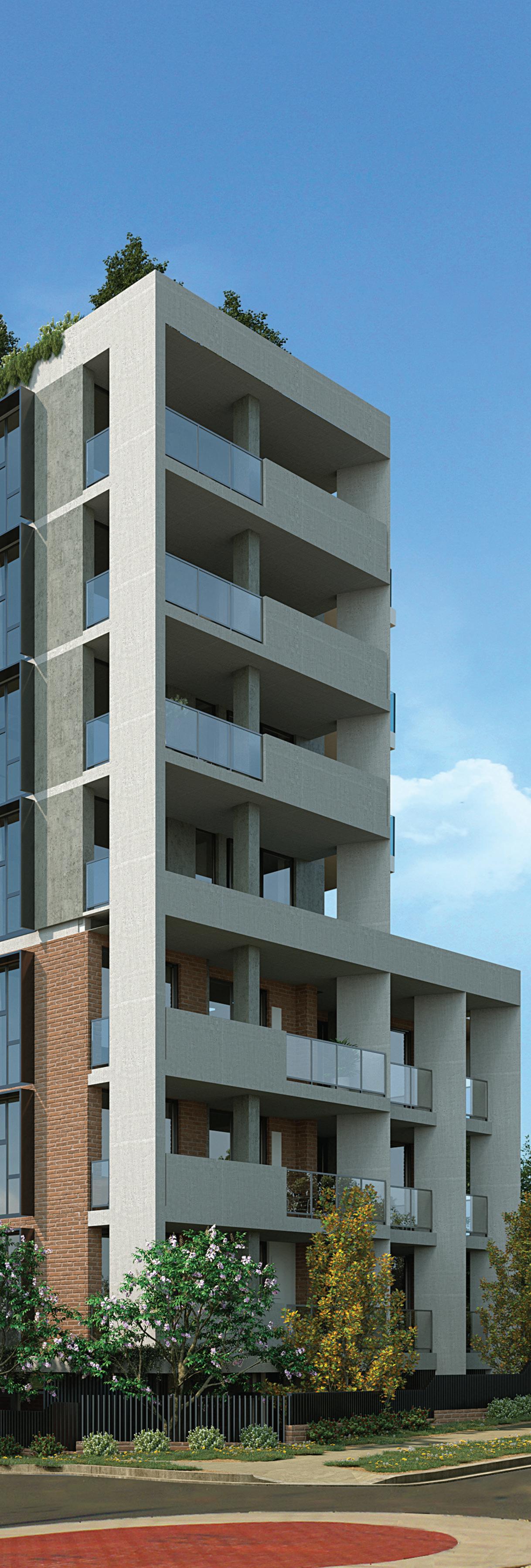
23
”
New plans for Hume’s development at Charles Street, Liverpool.
Our growth in Specialist Disability Accommodation
Hume is an accredited housing provider under the NDIS, and successfully completed the NDIS Audit for SDA registration.
We’re one of NSW’s largest SDA providers. Working with state government, we proudly support 480 customers in Hume-managed and developed group homes, with 10 new customers added this year. Twenty-nine customers, exercising choice and control, moved to more appropriate Hume SDA accommodation.
We continue to build our network of supported independent living (SIL) providers so customers are included in decision making and have more choice and control over their tenancy, home and living environment. We welcomed Wesley Mission onboard as a new partner.


146 SDA properties across 20 LGAs

67% of tenancies 5+ years
7.5% SDA market share in NSW
Our customers
24
<24 25–34 55+ 35–54 8% 51% 40% 1% Age range Gender 64% 36%
One in 40 NSW SDA participants lives in Hume accommodation.

We also:
⊲ rolled out our Customer Engagement Strategy, detailing how we provide customers with accessibility, inclusivity and an understanding of their rights and responsibilities
⊲ hosted six customer forums
⊲ implemented committee surveys so customer feedback and advice are at the centre of our service
⊲ participated in six disability expos to promote our services and current vacancies to new customers, guardians and SIL providers
⊲ informed our SIL providers via a quarterly direct mail newsletter – rights and responsibilities, tenancy management, home maintenance and repairs, property vacancies
⊲ created and filled a new role – Supported Housing Officer – responsible for wellbeing visits to monitor customer satisfaction about living in their home and safety within it
⊲ formally set our SDA Home and Living Standards to meet good and substantial repairs. These align to the Social Ventures Australia Disability Outcomes Framework and have synergy with Hume’s Outcomes Framework.
Our Assets team also maintained Hume’s SDA properties – 146 homes spread across 20 LGAs. We:
⊲ completed 38 home modifications/alterations
⊲ made 2,143 repairs
⊲ improved quality and safety for SDA customers – a new dedicated Customer Experience and Assets crossfunctional team improved responsive and planned maintenance.
Our SDA homes and service were independently audited during January and returned a 100% compliance result.
Our SDA partners:
⊲ Bridges Alliance
⊲ Cerebral Palsy Alliance
⊲ Global Disability
⊲ Kirinari
⊲ Life Without Barriers
⊲ Macarthur Disability Services
⊲ Northcott
⊲ Royal Rehab
⊲ Wesley Mission.
25
Housing upgrades
Maintaining safe and secure homes
Working in collaboration with service providers and strategic partners in government, Hume aims to deliver a maintenance service that supports customer safety and satisfaction. We manage four multi-trade contractors who undertake planned and responsive maintenance across our property portfolio.
Our commitment to cost-efficiencies and value-for money involves actively and regularly reviewing our approach, using the annual maintenance budget for reactive, cyclical and vacancy maintenance. We are able to direct a proportion of our maintenance expenditure towards planned upgrades and extending the life of Hume’s property portfolio. This aligns with our strategic direction and progress towards our sustainable development goals and encompasses both social and environmental outcomes.
This year we focused on our safety-first commitment, establishing a coordinated response where Assets works in unison with our Housing and Impact team to deliver a more cohesive service. Together we:
⊲ housed more people in need through faster turnaround of properties, achieving higher customer satisfaction and occupancy
⊲ delivered higher quality maintenance services, resulting in less recalls, less customer complaints and improved communication – further reducing vacant periods
⊲ achieved full compliance on our maintenance obligations for the portfolio, improving overall property condition via planned upgrade programs
⊲ increased satisfaction by making extra effort to treat customers with respect and dignity
⊲ improved Hume’s financial sustainability by strategically using maintenance budgets to increase the number of planned works
A $4.2 million capital works program boosted safety and amenity in our Hunter region homes.
⊲ contributed to positive environmental outcomes through ethical engagement with suppliers
⊲ built our reputation for offering a high-quality reliable asset maintenance service in the community housing sector.
As well as our regular work, the team also undertook an intensive capital works program designed to boost safety and amenity in our Hunter region homes.

26
CAPITAL WORKS PROGRAM
Hunter customers benefit from our investment in home improvements
We received $4.2 million from the NSW government’s $300 million investment in capital maintenance works aimed at improving quality and liveability in social housing managed by community housing providers.
Overseen by LAHC, the funds were provided to improve 403 properties in Maitland and Port Stephens. Many of these older properties were transferred to Hume in 2019 under the largest social management housing transfer in Australian history, and in dire need of improvement.
The program was designed to both upgrade housing condition and quality and assist in reducing future maintenance costs; along with easing cost-of-living pressures facing customers.
Thanks Hume!
We love the new bathroom ... tradies were great and you made the whole process so easy.
We acknowledge LAHC and the NSW Government for allowing us to extend the life of these homes, while creating an economic boost for trades and businesses in the local economy. We worked with our local multitrader maintenance and building contractors, Kingston Building Australia and Programmed Facility Management, who deliver maintenance services for us across the Hunter.
The project involved a total of 29 contractors and sub-contractors and created employment for over 64 workers, including 19 apprentices and trainees, and 13 Aboriginal and Torres Strait Islander trades people.
The upgrades included:
⊲ 29 new kitchens
⊲ 19 new bathrooms
⊲ 17 new roofs
⊲ 158 flooring replacements
⊲ 28 new property fences
⊲ 32 internal house paints.
We believe the quality and amenity of a home has a direct link to the health and wellbeing of its householders, so this funding injection has transformed lives.
Woodbury customer, Louise, a single mum to four young children, thanked Hume. The renovations to her house have been life changing. With a portable bathroom installed in her yard during the works, she praised the trades people who went over and above to consider her family and their pets. Today Louise is proudly redecorating, relieved to have the 40+ year old bathroom replaced with a modern one, better designed for her big family.
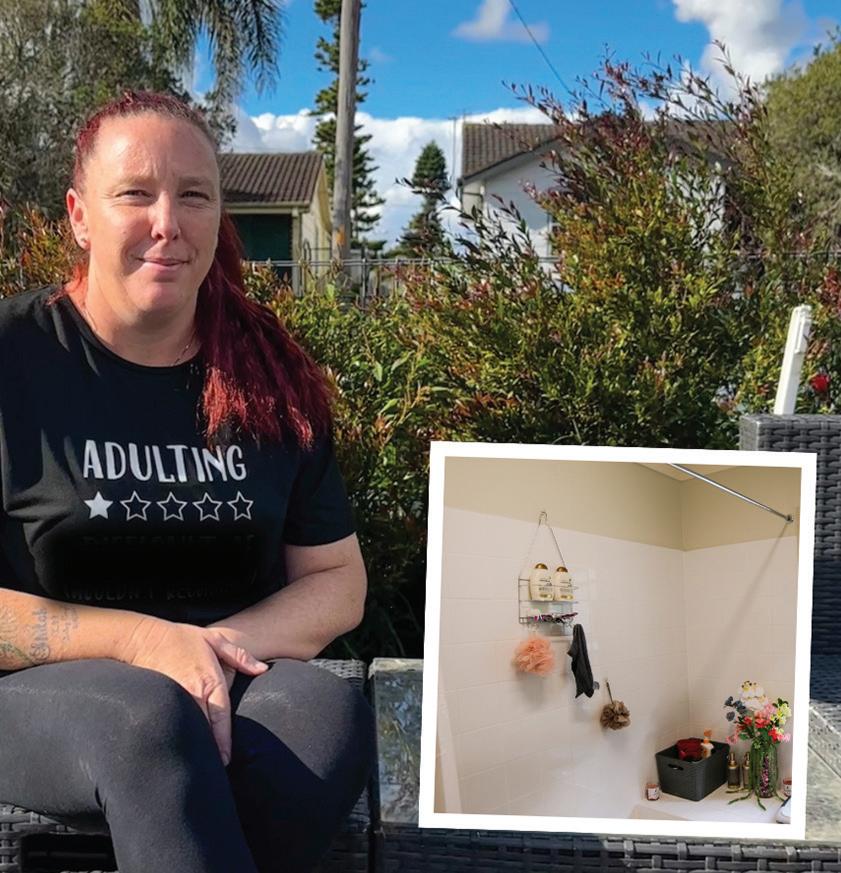
27
”
Customer satisfaction with repairs and maintenance
Our most significant improvement has been in satisfaction with repairs and maintenance. Since we started conducting customer experience surveys in January 2022, overall satisfaction has improved by 11%. Results indicate that both capital programs to improve our housing stock and positive changes to our repairs process, have contributed.
Customer satisfaction with capital programs increased from 50% in January 2022 to 63% in June 2023. Customer satisfaction with the repairs process increased from 53% in January 2022 to 64% in July 2023.
2022–23 snapshot
MAINTENANCE
Climate change and energy efficiency

We commenced a pilot of energy efficient technology hot water systems at a senior’s complex, replacing 18 older style water heaters with compact EcoVantage units. The benefit to our customers is expected to be financial savings of approximately $750 per year with the

28
Number of jobs – logged 18,575 – completed 16,570 % complete 89 Costs ($) – responsive 3,809,271 – planned 10,455,786 Total 14,265,057 CUSTOMER SATISFACTION (%) Satisfied with – property condition 63 – neighbourhood 69 – personal safety 64 – life as a whole 68 Improvement in feeling safe at home 34 Feel a sense of empowerment 70 CUSTOMER CONTACT Seeking housing options 10,864 Repair requests 8629 Total calls to 1800 004 300 17,586 Calls to Customer Service team 21,824
SOCIAL IMPACT
Maximise social impact through customer-driven services that change lives.
The negative impacts on Australia’s national economy and public finances, of our affordable housing shortage were at least $677 million per year in 2020 and may exceed $1 billion per year by 2036. These include greater pressure on government health budgets, higher justice system costs, reduced household consumption, poorer mental health – which can reduce work productivity and increase absenteeism – overcrowding, poorer educational outcomes and reduced wellbeing. There is good evidence that, when a person moves from homelessness to housing, their average health-related costs drop between $2,000 and $14,500 per year – the more support services they receive, the greater the annual saving.1
So, while Hume is committed to changing individuals’ lives through customer driven services, our sector-leading social impact work also reduce costs across society and benefits all Australians.
Our Outcomes Framework
Hume’s Outcomes Framework is starting to come online. We’re gathering statistically meaningful data about the social and cost benefits of our work. Power BI dashboards align our Outcomes Framework with our Customer Experience Strategy and provide indicators of success for every outcome. We approach outcomes measurement across three defined domains – Finding a Home, Living in a Home and Living in a Community.
1. Christian Nygaard, 2022, ‘Unaffordable housing: costing Australia $677 million each year’, Cities people love https://citiespeoplelove.co/article/ unaffordable-housing-costing-australia-usd677million-each-year

29
OUR CUSTOMER-CENTRED APPROACH
3. LIVING IN MY COMMUNITY
Hume’s customer-centred approach focuses on social impact and improving customer experience in three key areas

Customers are safe in their neighbourhood and can access the services they need. They increase their community participation, have improved access to employment and can contribute to Hume’s service design.
Customers feel like a valuable member of a connected community and are provided with a service that predicts and proactively addresses their evolving needs.
2. LIVING IN MY HOME

Customers progress on the housing continuum and exit homelessness.
A compassionate experience that helps Hume customers feel supported, informed and confident about how Hume can help.
1. FINDING A HOME
Customers sustain their tenancies and increase their tenancy management skills. They live in well-maintained housing and feel safe in their homes, which increases their wellbeing.

Customers feel empowered with up-to-date information when they need it, in a service that’s personalised and meets people where they are.

30
Housing Outcomes Framework Customer Experience Strategy
Hume’s Outcomes Framework is a game-changer because:
⊲ we are among the first in the community housing sector to offer real evidence of our impact – monitoring outputs is NOT the same as documenting outcomes
⊲ we are building this capacity in-house – removing the expense of ongoing consultancies and ensuring consistency, reliability and value-for-money
⊲ it’s an invaluable decision-making tool.
The Outcomes Frameworks has enabled us to measure the following outcomes for customers:
⊲ progression on the housing continuum
⊲ feeling safe in their homes
⊲ access to the services they need.
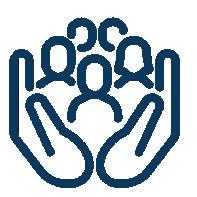
PROGRESS ON THE HOUSING CONTINUUM
Entry into social and affordable housing from homelessness, and living in housing that meets needs (%)
SAFE AT HOME
1. Positive exit from social and affordable housing: 11.5% in FY 22, 12.3% in FY 23. Entry into housing1 Housing meets needs 2022 2023 36 31 65 74
Customers feel safe in their homes (%) Very safe Sometimes safe Unsafe Not sure 76.6 8.5 14.4 0.5 31 ACCESS TO SERVICES 59 25 20 18 9 7 1 7 Employment & training Financial & food Health Family & youth Disability & carers Property care Aged care support Legal & mediation Referral services provided by Hume External services referrals Total 156
Minimising and reframing homelessness
Homelessness is an experience, not an identity, and can happen to anyone. A job loss, a relationship breakdown, an illness, in fact any major incident in life can trigger a spiral into homelessness and despair.
Hume is committed to making homelessness, rare, brief and non-recurring. Our work to minimise and reframe homelessness has made a big difference in many customers’ lives.
High success rates with Together Home – a DCJ funded housing and intensive support program to assist people experiencing longterm homelessness into stable accommodation and help them tackle any complex issues that might prevent housing stability – has seen 96% of participants move through the continuum from chronic homelessness to long term stable housing. Tranche three, our third round of funding, delivered another 19 places, totaling 70 packages and 73 participants in all. We submitted 23 NDIS applications for participants this year, with 12 securing NDIS status so far.
We’re recognised as one of only a few community housing providers with the in-house expertise to deliver all aspects of Together Home and we support it in both our regional and metropolitan locations. An analysis indicated a 1:1.53 benefit-cost ratio to avoided cost of homelessness. That is, for every dollar invested in this program we save government $1.50. We particularly acknowledge the support of our network of real estate agencies who help us secure suitable rental housing in a very challenging environment.

Hume’s integrated housing and support model addresses customers’ needs as they establish housing stability and traverse the housing continuum – always with the opportunity to secure future prosperity.
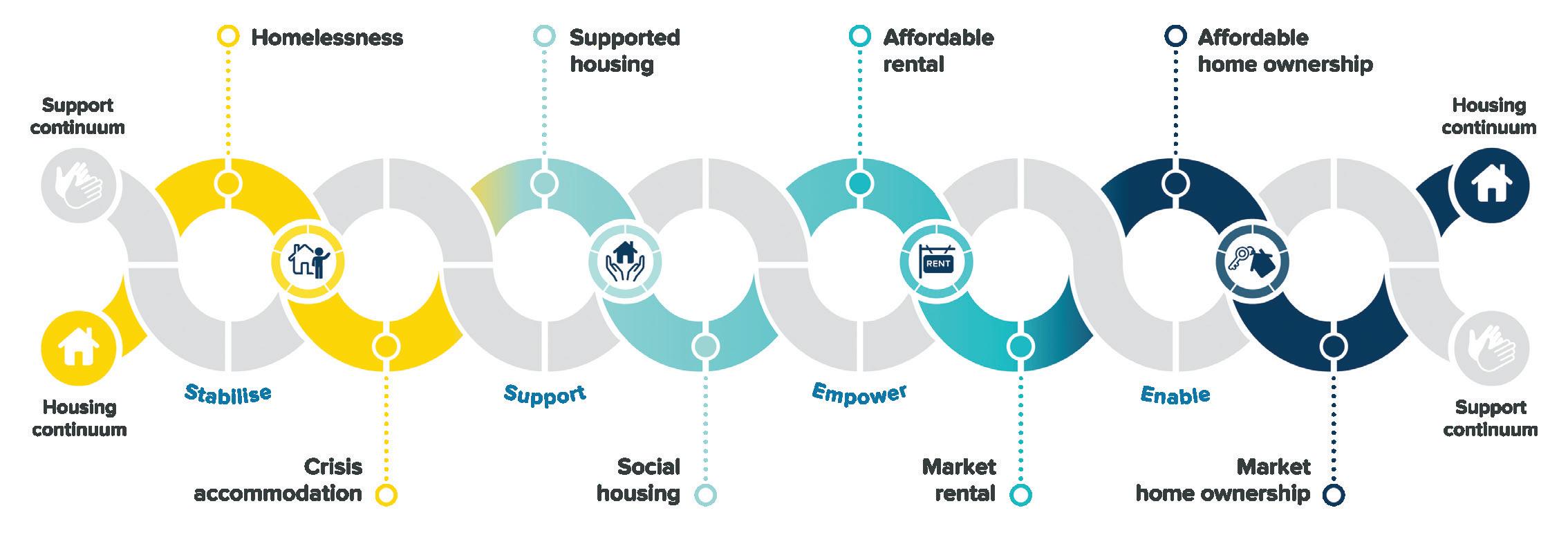
32
Hume and partners at the Maitland Homelessness Summit.
MAITLAND HOMELESSNESS SUMMIT
Hume plays a lead role in eliminating homelessness in Maitland
On Census night 2021, 391 people in Maitland were experiencing homelessness as cost-of-living pressures, rental rate rises and domestic and family violence took their toll. A staggering 35.2% of residents were experiencing rental stress.
The Summit
In May, with Maitland Council, we co-hosted the inaugural Maitland Homelessness Summit. It was designed to elevate awareness of the area’s homelessness problem and generate collective impact through combined advocacy, investment and partnerships. The summit was attended by 120+ community representatives, including local MP Jenny Aitchison; Homelessness NSW CEO, Trina Jones; charities; real estate agencies; local government and support services.
Hume’s role
The summit reinforced Hume’s reputation as a collaborative, values driven community housing provider. We focused on the importance of integrated support as customers traverse the housing continuum, reinforcing the ‘no wrong door’ approach. Customers may fall out of housing and programs, then re-enter. With the right services, encouragement and redirection they can achieve housing independence and secure employment. Some become private renters and a handful, home owners.

The Maitland Alliance is now in place, with Hume as an active partner and thought leader. The Alliance is working to see the summit’s recommendations implemented through advocacy and stakeholder engagement.
Summit recommendations
⊲ Implement a 10% target for all new builds to be social or affordable housing.
⊲ Call for government land to be used for social and affordable housing.
⊲ Introduce rates or planning cost relief for social and affordable housing.
⊲ Move the ‘Housing First’ model from pilot status to ‘core’ program design principle.
⊲ Establish a Maitland Alliance to End Homelessness.
⊲ Create a Private Rental Engagement project with flexible outreach to support people who are homeless.
⊲ Invest in, strengthen and streamline an early referrals pathway for ‘at risk’ tenancies in social and private markets.

33

Our other work to end homelessness includes:
⊲ the Port Stephens core and cluster project (see page 22)
⊲ the Carinya Program – Hume subsidises the rent (tapered over three years) of women and children escaping domestic and family violence, while outside support services help them create a long-term, stable tenancy and build a new life
⊲ Motto Farm – each night we supported people who are homeless and facing other disadvantage to access housing, and link with support services – we assisted hundreds
⊲ Housing Independence Program (HIP) –up to 12 months of transitional housing with support services; helping people who are homeless transition into long-term stable housing and independent living
⊲ Housing Options Team – helping find temporary accommodation for people who are homeless
⊲ Temporary Accommodation Program (TAP) – DCJ funded short term housing options which divert people from accommodation, such as motels, and supports moving into secure longer-term stable housing while bypassing the social housing waiting list
⊲ Supported Temporary Accommodation –safe and supported accommodation for people who are homeless
761 households went from homelessness into temporary accommodation
– 578 through Housing Options
– 183 through TAP
122 people experiencing homelessness assisted into stable accommodation through TAP and HIP
⊲ signing an agreement with DCJ to use seven former disability accommodation properties for HIP transitional housing. We partnered with Samaritans Youth SHS, Carrie’s Place SHS and Allambi to identify and support households experiencing homelessness into safe, clean, stable and supported accommodation until they secure a long-term housing solution
⊲ supported housing – supported transitional program for 12–18 months, aimed at breaking the cycle of homelessness
⊲ private rental assistance – rent arrears assistance for households at risk of homelessness
⊲ affordable housing – supporting Sydney and Hunter region families on low to moderate incomes to secure fee-for-service private rentals
⊲ participating in the first Port Stephens Council Homelessness Stakeholder Advisory Group – made up of councillors, council planning and community teams; and leading community and volunteer services. The first outcome was council providing three selfcontained, clean and safe place cabins at Soldiers Point for temporary or transitional accommodation. (The Advisory Group will meet biannually to focus on solutions.)
”
With rents rising across Australia, we appreciate the property owners who lease their homes to Hume customers, to help families stay safely housed.
34
Highlights from our housing programs in 2023
⊲ Carinya Program – successfully supported nine households. Eight will soon take over full responsibility for their housing lease.
⊲ Housing Independence Program – supported 53 households who were homeless into transitional housing and helped increase their independent living skills. The program achieved 55% positive exits and we’ll be expanding it into regional areas.
⊲ Housing Options team – supported 578 households to access temporary accommodation across Maitland and Port Stephens LGAs (some properties were repurposed SDA accommodation). This year the team took over 10,864 customer enquiries.
⊲ Temporary Accommodation Program –supported 183 households experiencing homelessness this year, Over 60% made positive exits, transitioning into more stable accommodation.
⊲ Supported Temporary Accommodation sought more opportunities to extend this service and partnered with Carrie’s Place (Maitland’s Specialist Homelessness Service) to deliver supported TAP to 67 households.
54 households achieved positive outcomes including:
24 moved straight into long-term secure housing
18 customers moved through the housing continuum onto refuge accommodation
12 customers moved into medium term accommodation.
⊲ Supported Housing – collaborated with support partners* across western and south western Sydney:
• 144 properties managed
• 235 customers transitioned from the program.
⊲ Private rental assistance
HOP rent arrears assistance was provided to 45 households at risk of homelessness in regional areas.
Private Rental Start Safely subsidies were provided to 172 households who were homeless, or at risk of it, due to domestic violence.
* Our support partners included Bonnies, Core Community Services, Mission Australia, Uniting and Community mental health agencies, Wayback and Wesley Mission. Services included person-centred case management; together with education and skills to equip customers to successfully manage their tenancy and understand their rights and responsibilities as a tenant.
Supported temporary accommodation housing outcomes in 2022–23 19 18 8 5 5 4 3 2 2 1 35 Self-supported motel Private rental Refuge Homeless Friends/family Not known Social other Caravan park Institution Social Hume
Positive exits 2020–23 (%) HIP Positive exits 2020–23 (%) TAP 2020 2021 2022 2023 58 57 63 60 2020 2021 2022 2023 69 72 55 55
TEMPORARY HOUSING OUTCOMES
POSITIVE EXITS FROM OUR PROGRAMS
–
–
–
TOGETHER HOME
William found a home and a renewed connection to Country
For William, an Aboriginal man originally from Walgett, life has been hard, with a disadvantaged childhood, family trauma and disconnection from Country and roots.
He spent eight lonely years living in his car, washing and brushing his teeth in service stations, after he lost everything, including his home and job. “I didn’t know where I would end up in those dark, frightening times. I moved all over the state looking for work. Every day was a mental battle.”
Fortunately, Hume found out about William and he joined our Together Home program, with the chance of a home and support. Trust is a challenging issue for William, especially regarding mainstream services and authority figures. But with patience, cultural sensitivity and a trauma-informed approach, Nigel, his dedicated Hume Customer Support worker and the Together Home team, has seen William form a strong and reciprocated bond.
“Nigel is the best person I could ask for,” William states, with genuine emotion. “He’s always there for me and I feel like I have someone to lean on. I can’t thank him enough.”
Support for William included a life-changing trip back to his Country to reconnect with culture and family and help tackle his isolation and sense of belonging. “I was regaining connection with my land and spirit, and it made me stronger” he says. “Now, I feel like a role model for my grandchildren. Being back in my Country lifts me up. I know when I need help, I can identify what it is I need to focus on.”
William is now happily settled in his new home, a seniors’ complex in a quiet suburban street, and working to improve his health. Safe, and supported by his new community, William loves pottering in the garden, nurturing his herbs and tomato crop, which he whips into delicious sauces. He is hoping to resume his trade as a butcher, once again bringing ‘paddock to the plate’.
For the first time William feels optimistic about his future, confident he has the skills and support to maintain his tenancy. Asked what he would say to his younger self, William replies, “Keep your head up. Every day is a different day, even if it feels the same.”
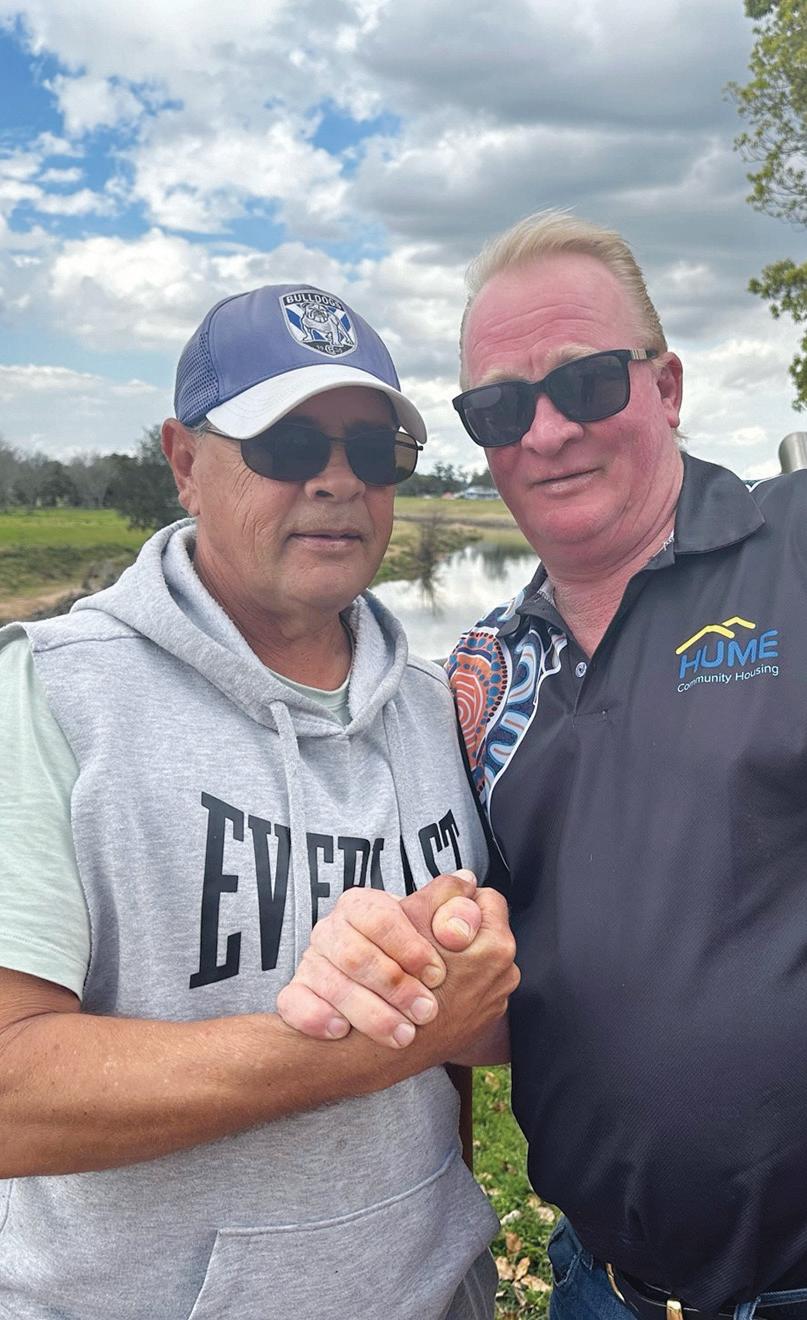
I feel like I have someone to lean on ... regaining connection with my land and spirit made me feel stronger. ”
36
Improving customer experience
Our Customer Experience Strategy is being implemented over four years. Customer experience refers to the perception a customer has of Hume, based on all interactions and touchpoints they have with us and considers emotions, feelings and their overall impression. We approach this across three defined domains – Finding a Home, Living in a Home and Living in a Community.
Our strategy, now in its third year, is improving processes, experiences and interactions for employees and customers. This work is central to our business transformation (see page 43 Thriving Organisation) and touches on people, processes, data, systems, and technology. It includes learning and development for our employees and ongoing service design considerations based on customer experience. It is based on a low effort, high trust model of service delivery.
Our Voice of the Customer program ensures customers have many opportunities to provide feedback and that we continuously listen and learn. Customer Voice groups allow people to express their opinions and concerns, and provide positive input and improvement to policies, services and programs.
Our efforts to get to know customers also better ensure that we focus on designing for liveability – so customers can better age in place longterm. This has long-term social benefits. One important thing we’ve done to improve customer satisfaction is focus on working better across teams. Our Housing and Impact team meets with Assets monthly to discuss how maintenance can be improved from a customer perspective. We’ve done simple things like requiring tradespeople to arrive on time, or call to explain if they’ll be late, and made more effort to manage customer expectations around what can be achieved in their homes. Better communication has improved how our customers feel about the services we provide.
Ongoing digital customer experience surveys will keep measuring key metrics quarterly, including customer satisfaction, ease, trust and wellbeing; monitor employee professionalism and respect; and track customer satisfaction with repairs and maintenance, complaints and appeals. Our surveys show increasing customer satisfaction.

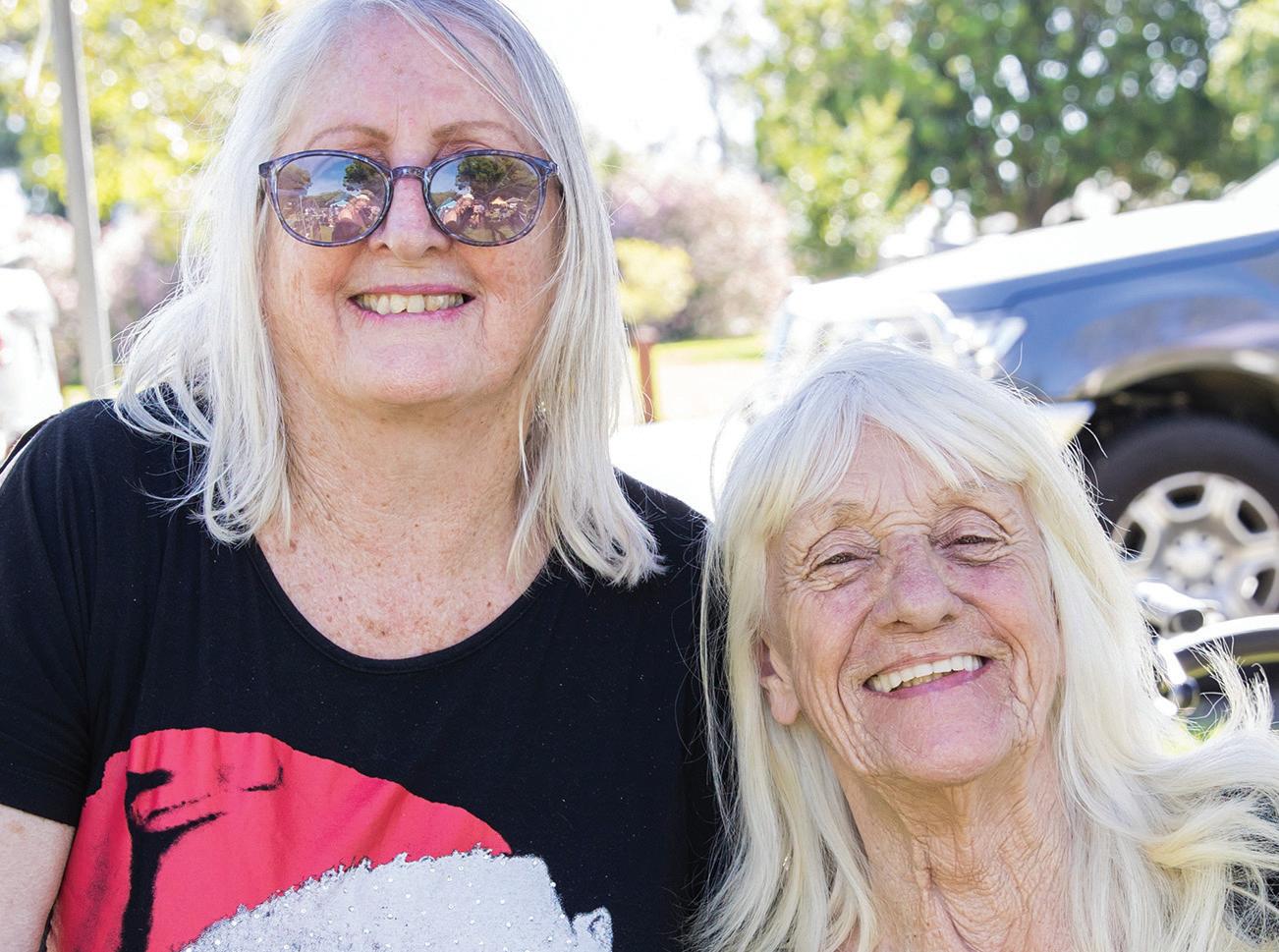
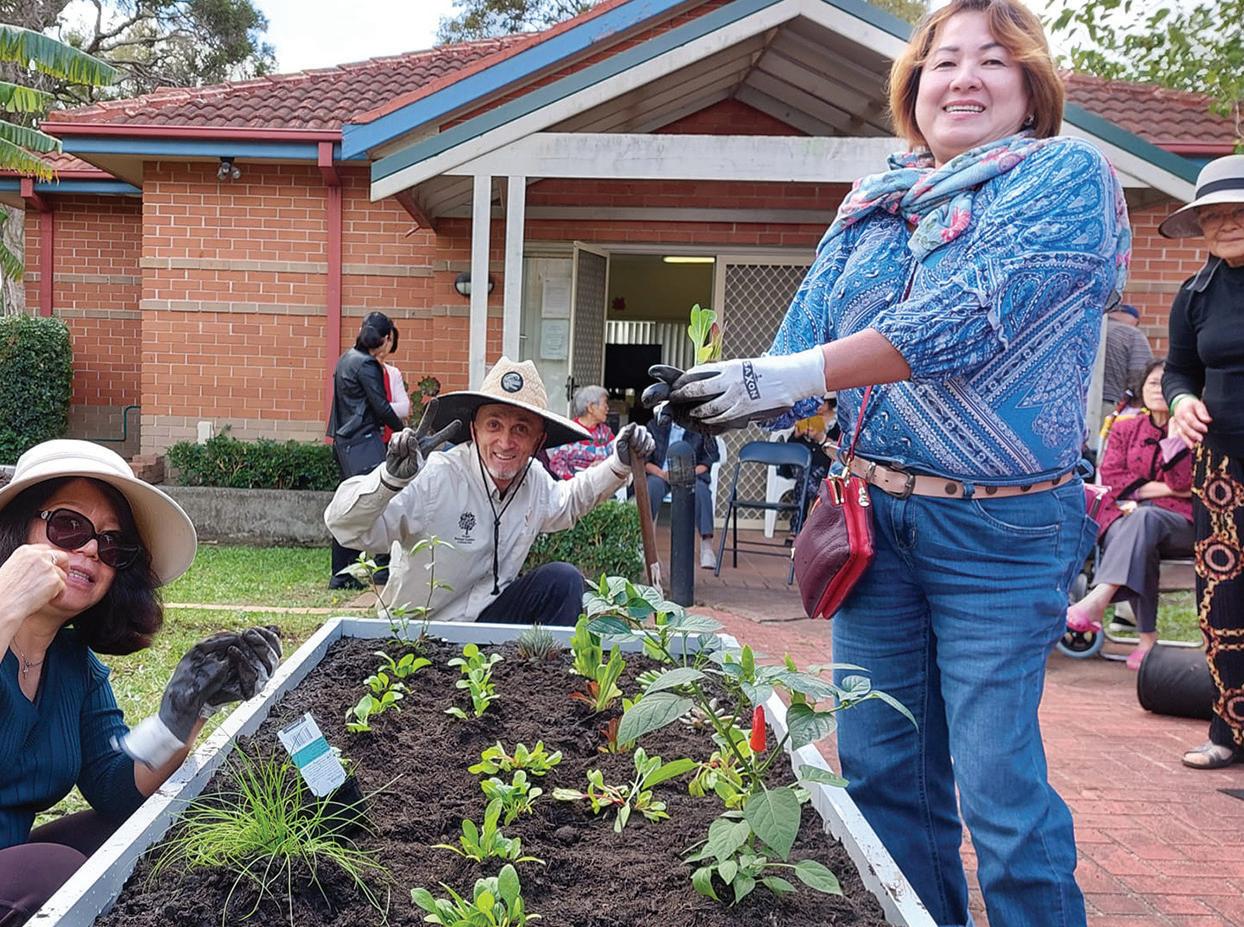

37
VOICE OF CUSTOMER SURVEY RESULTS
BACKGROUND
Voice of customer surveying started in January 2022 and measures customer satisfaction, ease and trust.
Key touchpoints
– repairs and maintenance
– staff professionalism and respect
KEY HIGHLIGHTS
An 11% improvement in satisfaction with repairs and maintenance.
Staff professionalism and respect is our highest overall score at 71%.
Repairs and maintenance satisfaction (%)
How satisfied were you with the overall experience of the repairs and maintenance service?
Listening to our customers
Hume customers can participate and provide feedback via different channels:
⊲ Customer Voice Leadership Groups –meetings held bi-monthly in metro and regional areas
⊲ Customer Voice Forums – held in the metropolitan region
⊲ customer block meetings
⊲ CHIA Customer Survey – benchmark survey measuring overall satisfaction with Hume’s services, repairs and property condition
⊲ customer experience surveys – quarterly (measuring overall satisfaction, ease and trust)
⊲ customer membership at Hume’s Annual General Meeting
⊲ refresh of the Board Customer Engagement Framework
⊲ a robust complaint and appeals process
⊲ MP and Ministerial representation
⊲ monthly reporting to the Board – providing transparency of complaints and appeals.
We’ve also:
⊲ taken initial steps to update the Customer Charter – this includes KPIs for items like phone response times and maximum days to resolve complaints –
10 working days for enquiries from Ministers or MPs
Staff professionalism and respect (%)
Staff are professional and respectful.
20 working days for customer complaints or appeals
⊲ worked toward providing better information for customers – for example creating and distributing simplified lease sign up packs and information fact sheets.
Complaints management
In 2022–23 we received 183 complaints and 59 appeals. A total of 194 complaints and 64 appeals were resolved*, 11 are ongoing and 20 were upheld. Overall complaint resolution satisfaction score was 51%.
* Resolved complaints and appeals includes open tickets from previous financial year.
Resident voice
Providing a high quality person-centric customer experience
Jan 2022 Jun 2022 Jan 2023 Jun 2023 53 52 54 64
Jan 2022 Jun 2022 Jan 2023 Jun 2023 72 72 69 71 38
Wellbeing and social engagement
⊲ Conducted 239 community events to promote inclusion and opportunity and build capacity – attended by 2,624 customers
⊲ Ensured our eviction rate remained less than 4% (sector is 10%) through tenancy sustainment programs.
Community cohesion is about how people live together in our neighbourhoods. Our Community Cohesion Strategy and Outcomes Framework ensures our community development programs align with, and deliver on, social impact domains including financial stability and training and employment outcomes. Our vision is for customers to live and contribute to communities and enhance their wellbeing through:
⊲ Sustaining home: Customers sustain their tenancy and have a sense of pride and safety in their homes.
⊲ Creating place: Neighbourhoods and communal places are safe, well maintained, welcoming and encourage connection.
⊲ Connecting people: Customers connect with their local services and increase their sense of belonging to their communities.
⊲ Facilitating participation: Customers participate in community life and Hume’s decision making.

Community cohesion
Hume’s Community Cohesion approach empowers customers to feel a sense of belonging and pride in their community through strong social connections. We have dedicated Community Cohesion Officers (CCOs) who work with community members and local support partners to develop and deliver programs that promote inclusion and opportunity and build capacity. In 2022 we delivered close to 240 local events and activities.

Social impact
Assisted 965 households experiencing homelessness to access temporary accommodation

SENIORS’ HUBS PROMOTE ACTIVITY AND INCLUSION
We manage a number of over 55s complexes across Sydney and the Hunter–Port Stephens area. Our seniors’ hub program commenced in 2022 and, this year, successfully transitioned to being self-led and managed by participants.
Programs tackle social isolation by building community and lasting personal connections, with customers reporting less feelings of loneliness and improved wellbeing.
In 2022–23, the program included line dancing, tai chi, gentle exercise with a trained physiotherapist, morning teas, arts and crafts and more. It is continuing in 2023–24.
39


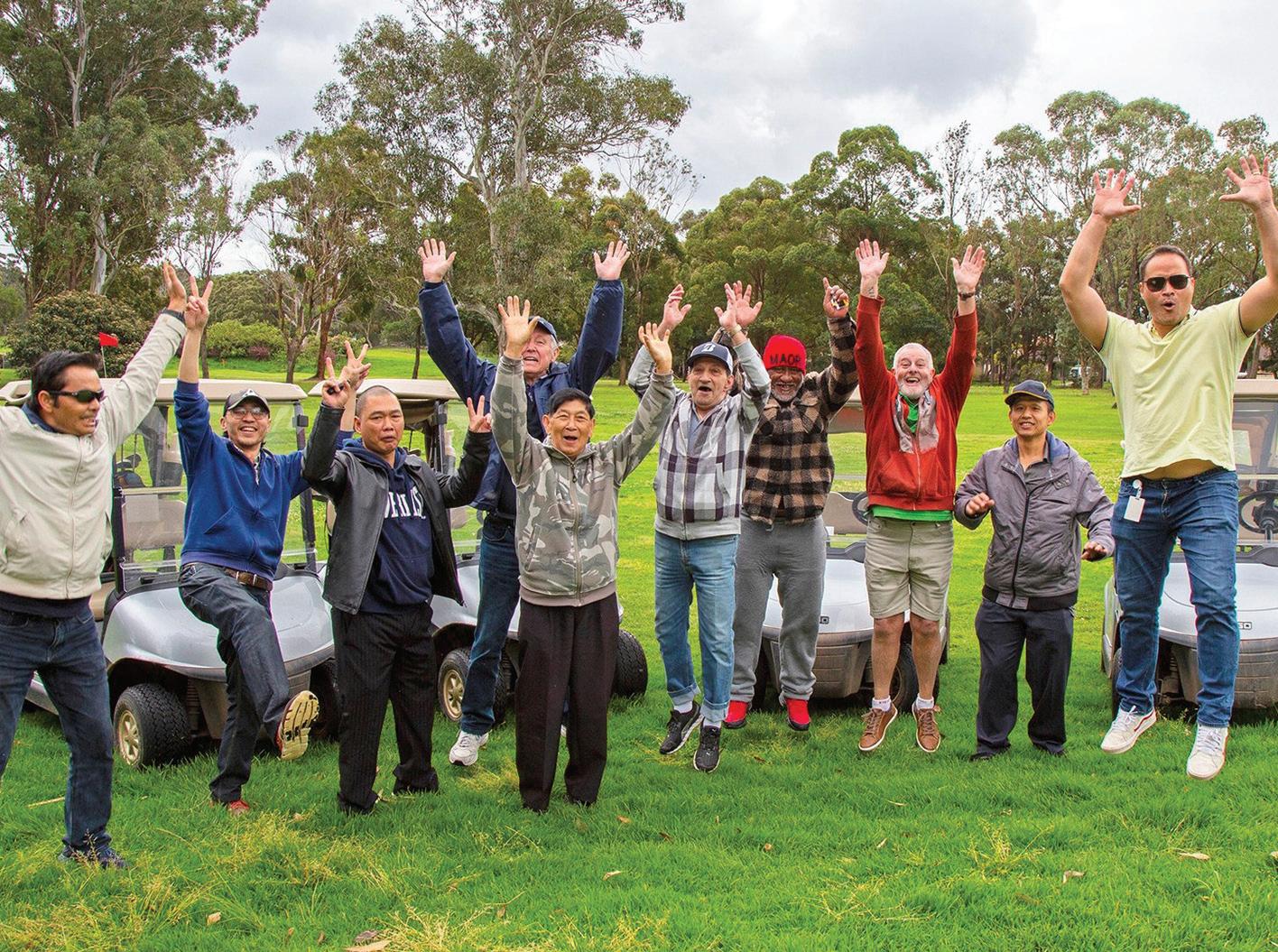
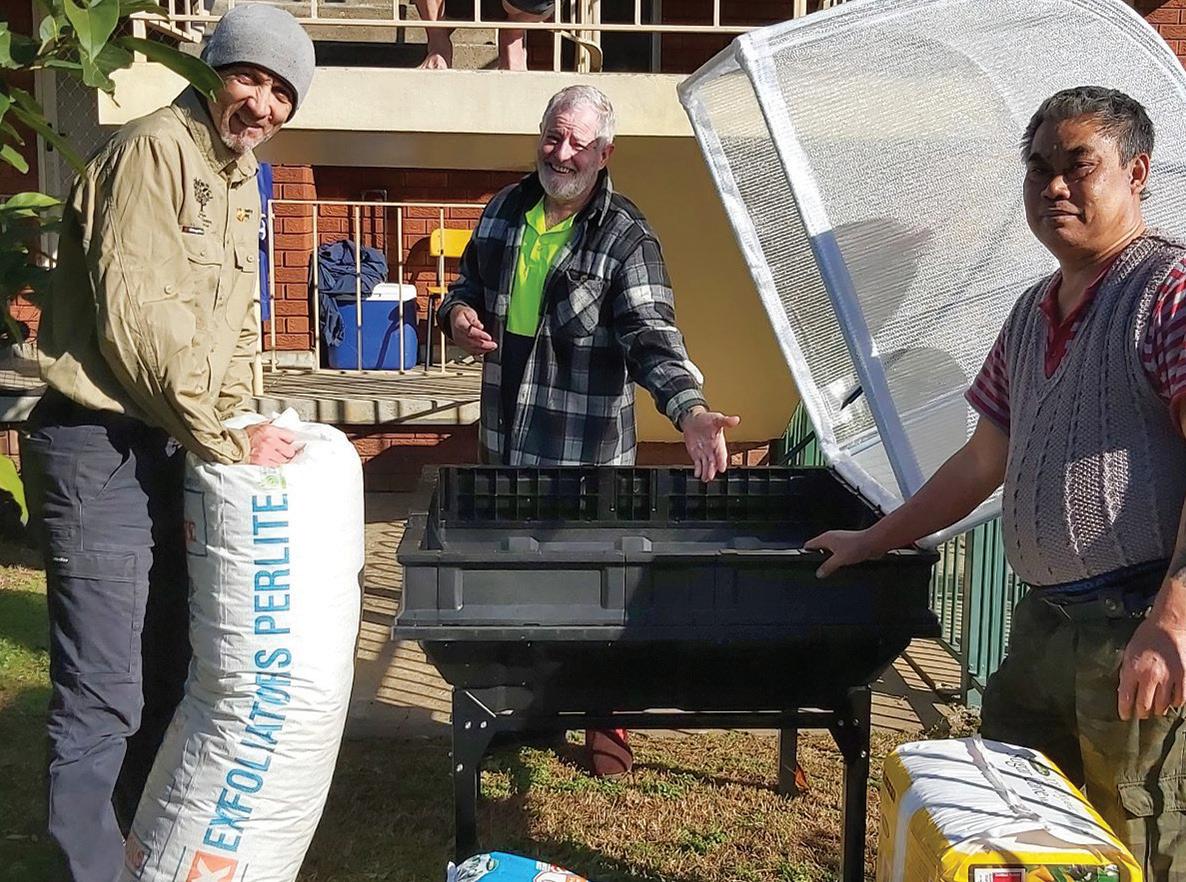
Our community cohesion initiatives
In 2022–23, we:
⊲ offered 100 customer engagement activities delivered for and with customers, aligning to social outcomes and connection
⊲ ran a rent arrears campaign from October to April, which saw tenancy sustainment officers work with over 200 at risk customers to establish payment arrangements and referrals to financial support services
⊲ focused on resuming customer wellbeing visits and property inspections post COVID-19 (these have been slow but we achieved an 85% completion rate for Hunter social housing customers receiving stimulus upgrades to their homes)
⊲ continued our unique Community Cohesion program where community officers complete a neighbourhood plan for the year to promote activities in their area, including –
Hume in Bloom – a spring garden competition celebrating good property care while encouraging customers to be physically and socially active
HuMen – a participant-led initiative building resilience in men living in social housing and ‘at risk’ of social isolation (see the full story opposite)
⊲ funded our unique ‘Ageing in Place’ neighbourhood officers in Maitland where we house many older people
⊲ launched our Rent it, Keep it (RIKI) program which educates people on their tenancy rights and responsibilities, equipping them to sustain their tenancies
⊲ continued funding our tenancy sustainment co-ordinators in four areas so that with 70+ tenants at risk, or in need of support, only two lost their tenancies.
”
We’re working on how we better measure the success of tenancy sustainment programs because they’re part of the reason Hume has lower than average eviction rates.
40
Some of the other programs our customers benefited from included:
⊲ back to school kits for high school students
⊲ Christmas cakes for seniors
⊲ community BBQs/lunches
⊲ community gardening programs
⊲ customer block meetings
⊲ firies’ safety presentations across multiple LGAs
⊲ food hamper support for families
⊲ Maitland seniors’ cyber crime program
⊲ Move to Connect – seniors’ program, Cabramatta
⊲ NAIDOC Week community BBQ
⊲ pet safety and microchipping days
⊲ Red Cross young parents program
⊲ street clean ups
⊲ support services expos, Fairfield
⊲ We Care Connect book donations
⊲ Youth off the Streets outreach program.

Resident support
Deliver sector leading support programs that facilitate social, physical and mental wellbeing
Stronger together
ONLY HuMen
In 2022, Hume secured a $20,000 NSW Government grant through the Stronger Together Program to implement HuMen.
One in eight Australian men will experience a mental health condition and, each day in Australia, approximately seven die by suicide. HuMen was designed to build resilience in men living in social housing.
The program attracted over 110 participants in Sydney’s south west who were identified as ‘at risk’ through social isolation, language barriers, financial hardships and mental health challenges. Their mission was to build a community and eventually selfmanage the HuMen support network.
At the end of the program:
⊲ 100% of the men reported being satisfied that they had better connections to their community
⊲ 85% reported that their knowledge and awareness of men’s health had improved
⊲ 85% felt better equipped to cope with future challenges.
HuMen was shortlisted for two awards.

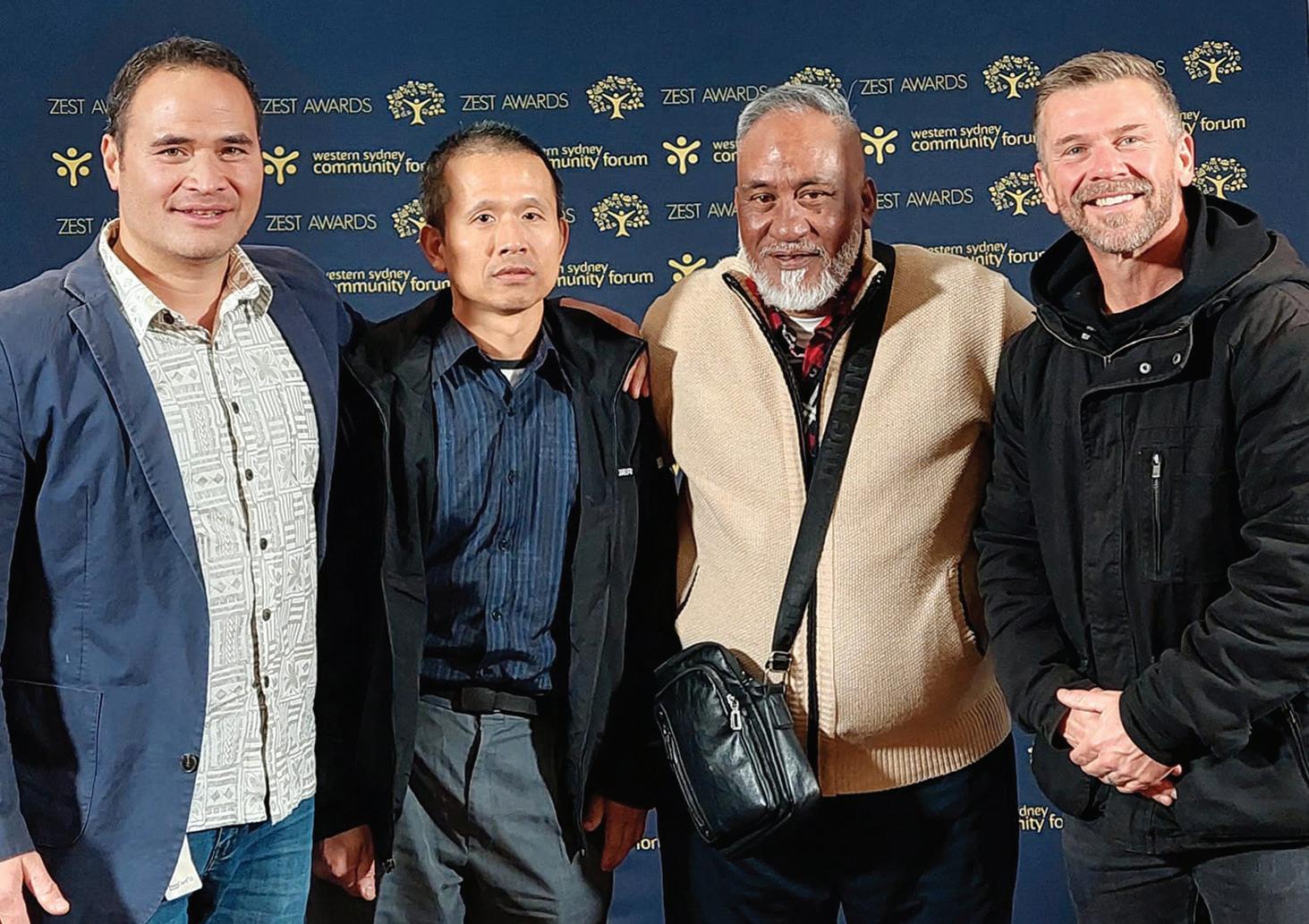
41
THRIVING ORGANISATION
Operate as a wellmanaged, accountable and transparent organisation with strong governance, committed to providing value for money and a measurable return on investment.
Performance highlights 2023
In 2022–23 we:
⊲ achieved 100% under National Regulatory Scheme for Community Housing (NRSCH) compliance review with zero improvement recommendations
⊲ successfully renewed Hume’s NDIS SDA registration
⊲ 93% of employees believe in our values
⊲ signed up our first Community Housing Industry Australia (CHIA) cadet
⊲ increased our advocacy efforts across key NSW events raising the profile of homelessness
⊲ made significant progress in our three-year project to design and implement a new core technology platform
⊲ improved tenancy management systems, reducing the administrative burden on our employees
⊲ expanded in-house data and business intelligence capabilities to fast-track decision making, reporting and impact measurement
⊲ improved contact centre change initiatives (workflows, rostering, reporting, recruiting)
⊲ measured contact centre performance improvements (call abandonment, speed of answer, response times)
⊲ process enhancements (repairs payments/ approvals, technical inspection process, multi-trader workshops, fire reporting).
Tackling rent arrears and sustaining tenancies
Supporting customers to sustain their tenancies is a key focus for us. Some customers may have challenges in establishing and keeping theirs due to financial, social, physical or mental health issues. We are committed to sustainable tenancies and invest each year in our Tenancy Sustainment Coordination program.
The program ensures customers identified as having ‘at risk’ tenancies, can access the services and support required to improve their situation and maintain stable housing.
Our experienced and dedicated Tenancy Sustainment Coordinators work with customers to assess their needs and establish goals that will improve tenancy skills and support meaningful outcomes. Collaboration with key service and support partners is imperative and Hume’s relationships with over 100 providers across the portfolio ensure clear referral pathways. Our team take a capacity building, skills-based approach, aiming to empower customers through education, information and access. This year we supported tenants to access financial services, family and domestic violence support services, NDIS and aged care services, employment, training and more.
We also designed and implemented a valuable, operational tool that gives our team instant access to data to proactively manage arrears. A huge reduction in manual processes means we can focus quickly on identifying customers who require intervention and help them access financial counselling and payment management options early when a problem is easier to solve.

Safe@home
We create safe homes for our customers by identifying opportunities for continuous improvement to our services.
Our Safe@Home campaign and Customer Safety Committee help ensure homes are safe and fit for purpose. The Committee has representatives from every department at Hume, reinforcing the fact that safety is everyone’s business.
Our committee dedicated 2023 to ensuring customer and employee safety is a key indicator of how well we are addressing and minimising risks across our organisation. We improved reporting, monitoring, triaging and prioritisation of safety incidents. We undertake ongoing incident review and use these learnings to educate our employees and customers.
42
Business Transformation team
We established a Business Transformation team in 2023 to work on how we can operate Hume more efficiently. We did this in response to a business realignment we did in late 2022 to identify any structures and obstacles that hinder our performance. The team will ensure that key projects are successful, and support Hume’s vision and growth ambition.
The team comprises subject matter experts looking at how we can improve, particularly in finding efficiencies, lifting our performance, or improving the overall experience for employees, customers, partners and stakeholders.
In collaboration with operational GMs, the team has defined priorities and strategies for improvement in key areas, including revenue generation and reporting. Two achievements this year include:
⊲ a Change Management Strategy for priority initiatives to standardise and guide the business through transformative journeys
⊲ getting a significant multi-year project underway to deliver a new core housing digital platform – this will improve efficiency, customer satisfaction and employee retention and engagement.
Legal risk and compliance
This year we reported 100% compliance with all performance outcomes under the National Regulatory Code during our annual NRSCH compliance review. This is an outstanding result and demonstrates that Hume is a well-governed, well-managed, sustainable community housing provider. We are:
⊲ ready to scale up to meet the growing housing needs of NSW
⊲ a safe pair of hands for government and social impact investors wanting to participate in the delivery of affordable housing.
We also successfully renewed Hume’s NDIS SDA registration.
Risk management is a key focus area for Hume, and we strengthened our incident management with systems improvements to deliver better data, trend analysis and reporting.
Internal audit
This is delivered via the Legal, Risk and Compliance function. It assesses and assures the Board, the Governance and Review Committee and the executive team about the effectiveness of Hume’s Enterprise Risk Management System and its policies and procedures. Internal audit allows for identification and implementation of improvements within the business both from a risk management and operational policies and procedure perspective.
IT and Business Services
A thriving organisation is one dedicated to identifying continuous improvement opportunities, transforming operations to address pain points or operational inefficiencies. Some things IT and Business Services did this year:
⊲ continued to strengthen and align our systems to boost security and align with industry best practice
⊲ improved internal and external collaboration and work systems to enhance efficiencies for employees
⊲ supported systems development of a new core platform, alongside the Business Transformation team
⊲ further expanded our in-house data and business intelligence capabilities with two dedicated resources – this has improved decision making, reporting and impact measurement.
43
Employee opinion survey snapshot
74% employee engagement score

96% aware of Hume’s values
93% believe in Hume’s mission and values
93% have good working relationships with their co-workers

Our employees
Our employees are the foundation of Hume and our success. Their dedication, talent and passion drive our achievements and are the cornerstone of our customer-focused operations.
During the pandemic most customers transitioned to engaging with us online or over the phone. We have continued a flexible hybrid work environment and, as a cost efficiency measure, in 2022 closed two of our offices in Parramatta and Claymore.
Our workplace uses a range of forums and meetings, both online and in person, to build connections and collaboration and ensure our culture remains strong.
How our employees feel about Hume
The 2023 Hume Housing Employee Engagement Survey achieved an excellent participation rate, with 88% of employees completing it.
Employee Opinion Index
Job satisfaction remains high at 80% favourable, with 89% of employees reporting that they enjoy the type of work they do. Organisational commitment is also strong at 82%. Most staff feel a sense of pride working for Hume Housing (85%) and are willing to put in extra effort (89%).
Compared to the industry benchmark, Hume Housing outperforms other similar organisations in the areas of diversity (+8%) recruitment and selection (+6%) and talent (+5%).
WORKFORCE DATA 2022–23
1.
3.
44
Employee turnover (voluntary) 27% Number of FTE1 employees 147.9 Gender pay gap 24.4% Training expenditure $80 k Employee profile – Female 76% – Male 24% – Average age (years) 43 – Internal promotions2 16 – New recruits 70 – EAP3 use (hours) 46.5
Full-time equivalent.
April 2022 to June 2023.
2.
Employee
Assistance Program.
In 2022–23 Hume employees celebrated diversity and community connections via an employee-led social committee. We attended and organised events to:
⊲ raise the profile of community housing and our service
⊲ promote and celebrate diversity
⊲ create opportunities for customers and employees to come together
⊲ promote health and wellbeing in the workplace.
Events we supported included:
⊲ Biggest Morning Tea
⊲ Bring your kids to work – end of year party
⊲ Community Housing Step Challenge
⊲ End of year customer events
⊲ International Women’s Day
⊲ NAIDOC week BBQ with customers and community
⊲ National Reconciliation Week breakfast
⊲ Street count, Hunter
⊲ Tenambit Mural project
⊲ World Pride month.

Employee wellbeing
Prioritise the health and wellbeing of our people
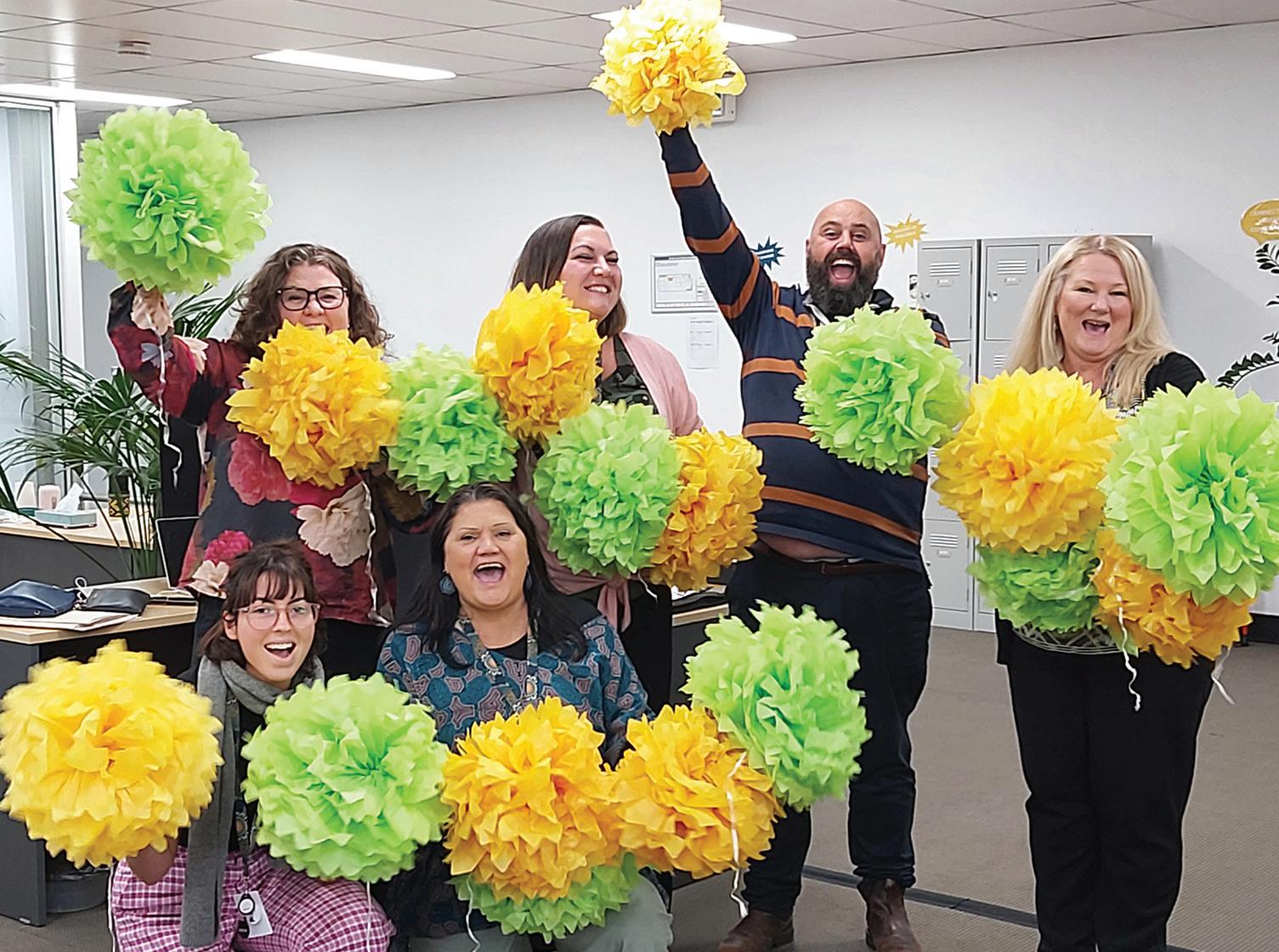

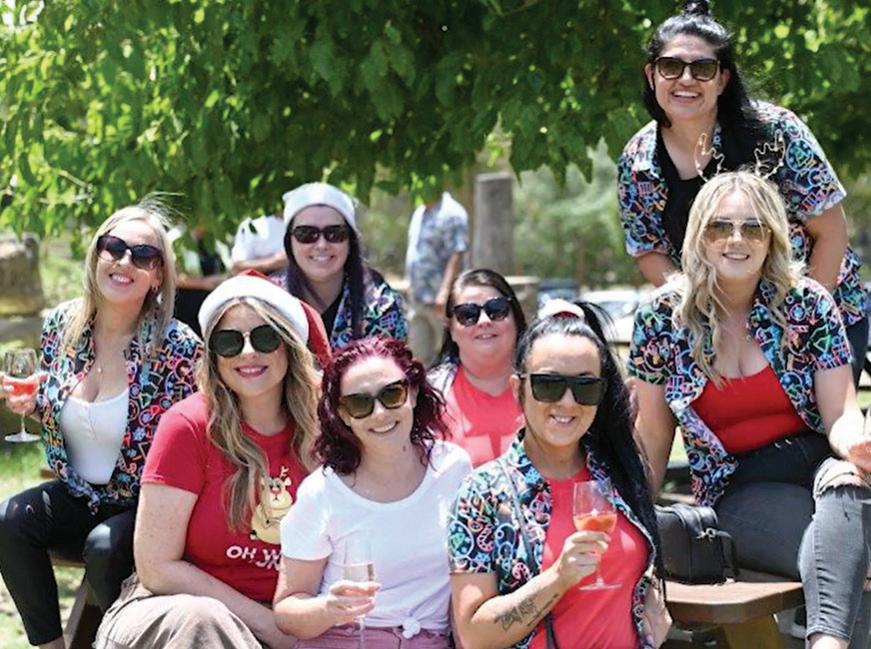

45
CHIA CADETSHIP PROGRAM
Meet our cadet, Kiara Saunders
This year Hume welcomed 23-year-old Kiara Saunders as our first cadet under the CHIA NSW cadetship program.
Backed by NSW LAHC, Kiara’s program includes enrolment in a nationally recognised Certificate IV in Housing qualification and a paid placement covering application/allocation, tenancy management and property management.
A career in housing is a launch pad to a wide range of opportunities: from working directly with tenants and applicants to understand their needs, to assessing and overseeing property management, to helping customers sustain their tenancies or delivering community cohesion programs – right through to administrative functions in finance or marketing. Importantly, it can open doors to a job as a specialised case worker in areas like homelessness or domestic violence assistance, community support work, the NDIS and specialist housing. Knowing how the housing system works is invaluable in supporting people and communities to thrive.
Now halfway through the program, Kiara has worked in multiple teams at Hume, building a comprehensive 3600 view of the programs and services offered while learning what is needed to deliver high-quality customer service. “I was over the moon when I found out I had been chosen as Hume’s cadet. I was at a point in my life where I felt a bit directionless following a family tragedy and had retreated into my shell.”
All that has now changed for the young Aboriginal and Cook Islander. “I want to do well in life and love learning, Hume welcomed me so genuinely and warmly that I felt part of the team immediately. I love seeing how we help change customers’ lives.”
Kiara wants to work with children in the future and her prospects look incredibly bright as she builds a solid grounding and qualifications in housing.

I was over the moon when I found out I’d been chosen as Hume’s cadet ... I love seeing how we help change customers’ lives. ”
46
Employee awards
CEO Award
Together Home team
Highly commended:
Chantelle Woolridge
Leadership Award
Karlie Cook
Highly commended: Anna Brachmanis
Rising Star Award
Anand Najana
Highly commended:
Renee Marshall
Samantha Curtis
People’s Choice
Christine Malton
Cool in a Crisis Technical Officers
Highly commended: Neighbourhood Officers
Employment anniversaries
10 years
Christine Malton
Chantelle Woolridge
5 years
Lorins Dawood
Jessica Thomas
Safa Shalak
Sean Parker
Diane Thomas
Daniel Wong
Sylvia Hanna

47
Hume’s advocacy work in the community
Hume plays an important role in promoting the sector and the work we do; identifying opportunities to address housing affordability and homelessness. We advocate for our customers and communities across government and the private sector. Here’s just some examples of our advocacy this year.

Hunter Street Count
– Street sleeping is only the tip of the homelessness iceberg. Our teams took to the streets of the Hunter and Port Stephens in the early hours of the morning to help DCJ count the homeless in our region.

Maitland Drug Action Team (MDAT)
– After three years leading the MDAT, Hume has stepped down as ‘chair’ of this partnership, which works on preventative projects to reduce the harms associated with young people’s use of alcohol and other drugs. We remain on the committee.
⊳ Meeting with local representatives
– Welcoming Dai Le MP, Member for Fowler, and Fairfield City Councillor, Kevin Lam, to our Hamilton Road, Fairfield development to meet with customers.

⊳ GWS Housing Summit
– Chair Sue Holliday presented at the Greater Western Sydney Housing Summit.
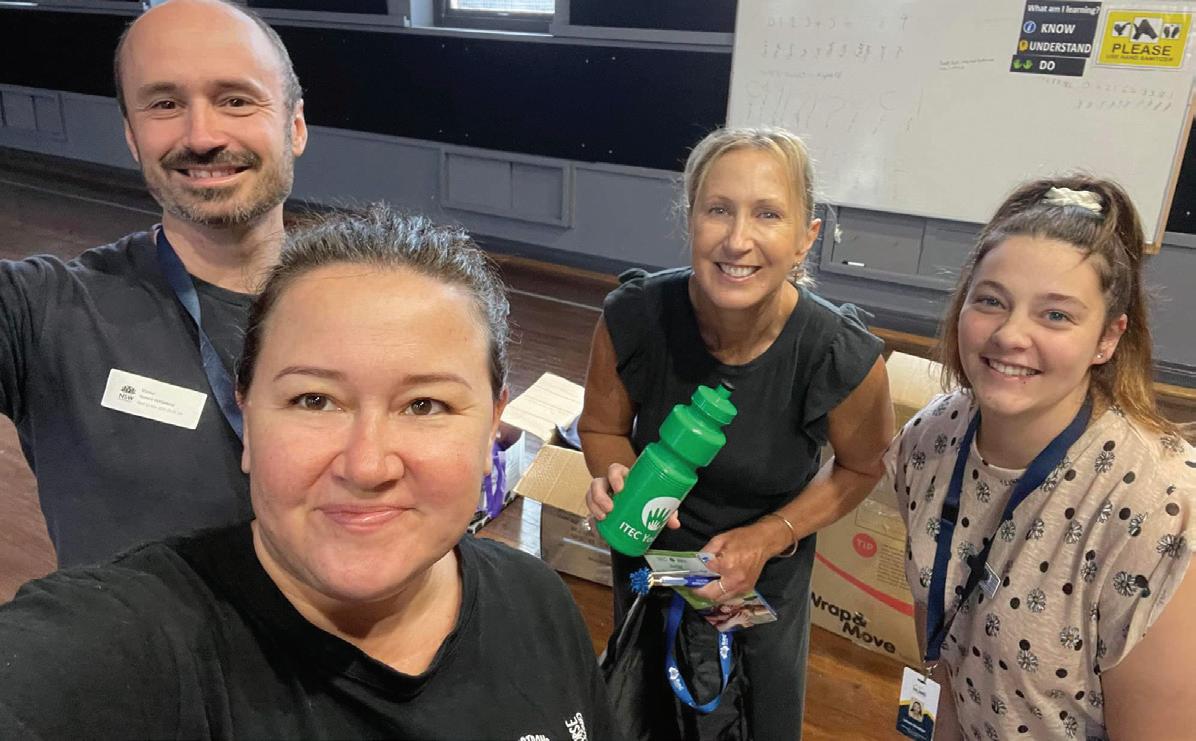
48
⊲ Hunter
⊲ Hunter
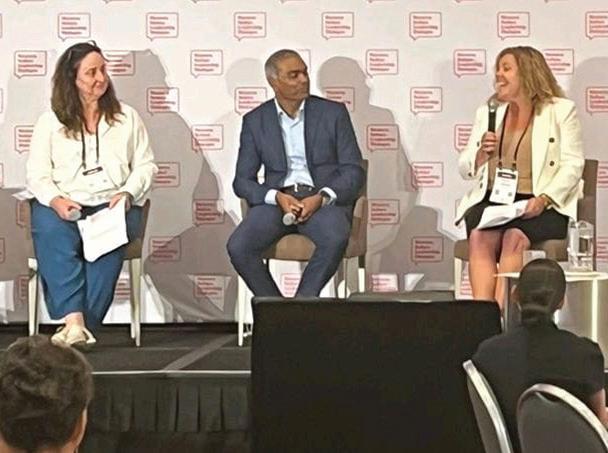
Together Homes at the CHIA Conference 2023
– Hume presented on the Together Home Program. We are one of only a few CHPs delivering the full program in-house. We showcased our expertise in supporting customers with complex needs.
⊳ Western Sydney Leadership Conference
– Former CEO Nicola Lemon (right) represented Hume as a panellist at the conference as part of our commitment to raising recognition for the sector and highlighting the housing affordability challenges customers and communities face across NSW.

Awards for our work
PowerHousing
Outstanding Sector Leadership Award
Nicola Lemon outgoing CEO, November 2023
Shortlisted
Golden Pineapple Diversity Awards 2023
– Hume Housing Options Team
Zest Awards 2023
– HuMen Program
AHI Brighter Futures Award 2023 – HuMen Program
49
⊲ Hunter
OUR MANAGEMENT & ACCOUNTABILITY
As a registered Tier 1 Community Housing Provider, Hume operates under the NRSHC regulations.
The Australian Securities Exchange Ltd (ASX) describes corporate governance as ‘the framework of rules, relationships, systems and processes within and by which authority is exercised and controlled in corporations.’ It encompasses the mechanisms by which Hume, and those in control, are held to account.
As a not-for-profit organisation, Hume is not a listed entity, therefore ASX’s Corporate Governance Council recommendations may not be relevant or appropriate to Hume’s circumstances. However, our Board believes that Hume must provide the same robust governance framework and operate in accordance with ASX principles. These have been included in our governance principles.
Our Board
Our Board of Directors is structured around principles of good governance and has an independent skills-based board with up to 10 directors. Our directors have experience and skill sets that support the scale and scope of our business as well as our planned growth. These span skills and expertise in governance, legal, risk and compliance, information technology, marketing, property development, financial management, human resources, community services, urban planning, housing, disability services and asset management.
The Board is committed to strong governance, community spirit and advocacy for those who require assistance. It undertakes annual reviews of its performance to ensure it is performing to its maximum effectiveness and that appropriate governance arrangements are in place.
In addition to a skills matrix and annual skills gap analysis, all directors are encouraged to attend training and professional development courses, as required, at Hume’s expense.
While the Board is ultimately responsible for corporate governance, good corporate governance is a shared responsibility. Board members, our CEO, our executive team and Hume employees all play a role.
All employees and directors must comply with Hume’s code of conduct. Board members and employees are governed by Hume’s Conflict of Interest policy and disclosure is called for regarding all matters/decision making to ensure no conflicts exist. If identified, directors sit out decision making. Minutes of each Board meeting record any declared conflicts of interest as a standard agenda item. New employees are required to complete a Conflict-of-Interest form at the time of induction and then again, annually.

Good governance
Establish a framework of rules, relationships, systems and processes
50
Meet our Directors

Sue Holliday
Board Chair, member of the Growth, Development and Sustainability Committee (from 2 May to 30 June 2023), member of People and Culture Committee
Life Fellow, Planning Institute of Australia, FPIA, CPP, Graduate of the Australian Institute of Company Directors (GAICD), BA (Economics), MPhil (Town and Country Planning)
Sue Holliday is a city planner and economist. She was Professor of Planning Practice at UNSW until February 2020. She ran her business, Strategies for Change, an urban strategy consultancy until 30th June 2019.
Sue had a long career in public service and has demonstrated an outstanding commitment to affordable housing. She was Director General of Planning in NSW from 1997 to 2003. She was instrumental in establishing the City West Housing Company to achieve ongoing affordability options in Pyrmont and Ultimo. She introduced affordable housing as a planning objective into the EPA Act 1979 and introduced inclusionary zoning into planning instruments so development could contribute to affordable housing outcomes.
She was a member of the National Housing Supply Council from its inception to its closure in 2013. Sue has held various board roles including as Director of the Transport Infrastructure Development Corporation from 2004–10 and President of the NSW Building Professionals Board until June 2013.
Sue was elected to the Hume Board in April 2014.

Robert Vine
Member of People and Culture Committee (1 July to 9 November 2022), member of Customer Experience Committee (1 July to 9 November 2022) DipMngmt, GradDip HR, MAICD
Robert Vine served 20 years on the Hume Board including a two-year spell as Chairman before being appointed again to the Director position in 2012 after a three-year break.
Robert has been involved in ‘not-for-profits’ management since 1972, culminating in retirement as CEO of one of the state’s largest groups of co-operative housing societies.
With tertiary qualifications in management, human resource planning, accounting and financial management, Bob offered Hume an all-round raft of experience. Still serving on the NSW Government Co-operatives Advisory Board, he is actively involved in the provision of affordable housing.
Robert resigned from the Hume Board on 9 November 2022.
Robert was announced as Hume’s Patron in November 2022 replacing outgoing Patron, Patricia Martin OAM.
51

True Swain
Director, Chair of Growth, Development and Sustainability Committee and member of Governance, Audit and Risk Committee
JD, MBA, MProDev, BCPM, GAICD
As an experienced senior executive manager and director, True possesses extensive expertise in professional property development, project management, risk mitigation, corporate governance, and business acumen, spanning both the public and private sectors.
True’s capability in property development encompasses the entire spectrum of the development lifecycle: master planning, development feasibility, business case, site identification, conception of innovative property development outcomes, authority approvals, procurement, delivery management, and the holistic oversight of property asset lifecycles. This invaluable experience has been effectively employed across an array of diversified property portfolios across Australia, and was instrumental in propelling these organisations towards their growth and strategic objectives.
His professional experience is complemented by his broad tertiary qualifications. True was elected to the Hume Board in March 2014 and is passionate about the provision of sustainable homes and services that will enable Hume’s customers to thrive.

Phillip Hepburn
Deputy Chair, Chair of Governance, Audit and Risk Committee and member of Growth, Development and Sustainability Committee
BEc, LLB, LLM, GradDip Company Secretarial Practice
Phillip has extensive experience in setting up legal, governance and compliance functions, advising boards on all aspects of legal and compliance issues. Phillip was previously General Counsel and Group Secretary at Stockland where his role also included providing commercial and legal advice on business and property acquisitions and sales, and on all aspects of property development and capital management activities undertaken by the organisation. Phillip has extensive experience in management across the property, banking, retail and agricultural sectors and has also acted as a mentor to senior executives. Phillip has a strong interest in the areas of Board governance, risk and compliance.
Phillip was elected to the Hume Board in February 2016.
52

Jayson Bricknell
Director, Chair of Customer Experience Committee, member of Growth, Development and Sustainability Committee (1 July 2022 to 2 May 2023) and member of People and Culture Committee (2 May to 30 June 2023)
BEc, GAICD
As an experienced financial services executive, Jayson built up broad business experience across a number of disciplines. He has specific expertise and a proven track record in customer experience, program and project management for system deliveries, stakeholder engagement, transformation programs, operational performance improvement, growth and strategy definition and execution (including mergers and acquisitions).
His experience includes ten years with Westpac/BT Financial Group, two years with Third Horizon Consulting, 15 years with Macquarie Bank and seven years with Arthur Andersen and Co and PricewaterhouseCoopers. Jayson is currently working in the social sector with a leading charity and he coaches/mentors social enterprises.
Jayson was elected to the Hume Board in March 2017.
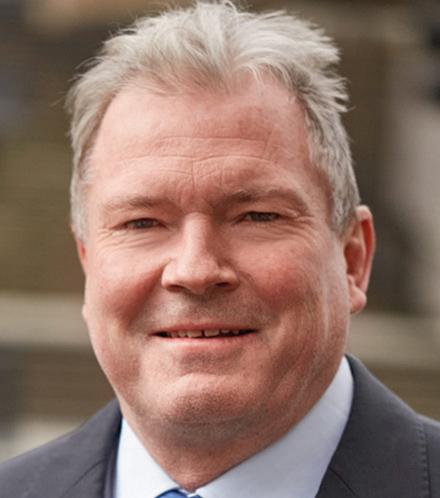
The Hon. Nathan Rees
Director, Member of Growth, Development and Sustainability Committee (1 July 2022 to 2 May 2023), member of Governance, Audit and Risk Committee and member of Customer Experience Committee (2 May 2023 to 30 June 2023)
Nathan Rees has lived his life in Western Sydney and has 28 years’ experience in public administration. After completing a horticulture apprenticeship, he undertook an Honours degree in English Literature at Sydney University.
Nathan served in the NSW parliament from 2007–15, including as Premier of NSW, Minister for Water, Minister for the Arts, Minister for the Central Coast and Minister for Emergency Services. He was the member for the Western Sydney seat of Toongabbie. He has a passion for Western Sydney and social justice.
Nathan was elected to the Hume Board in February 2017.
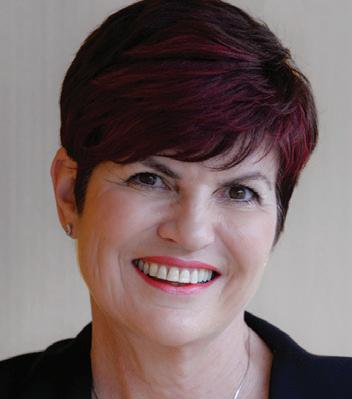
The Hon. Robyn Parker
Chair of People and Culture Committee and member of Customer Experience Committee
GAICD, JP
Throughout her life, Robyn Parker has worked to support, develop and strengthen individuals, families and communities. Robyn has over 32 years of public sector experience which included roles in Child and Family Services, as a TAFE teacher and as CEO of Ageing and Disability Services.
Robyn served in the NSW Parliament for twelve years, first as a Member of the Legislative Council, followed by four years as the Member for Maitland. Robyn chaired many parliamentary inquiries and was the NSW Minister for the Environment and Minister for Heritage (2011–14).
Since leaving politics, Robyn has been appointed as a non-executive Director to a number of environment, education and for-purpose organisations. She is currently Deputy Chair of the NSW Heritage Council.
Robyn was elected to the Hume Board in February 2019.
53

Shirley Liew
Director, Member of Governance, Audit and Risk Subcommittee, member of Customer Experience Subcommittee
BBus (Finance), MBA, FAICD, FTIA, FCPA, IIA, ISACA, FINSIA (Aff)
Shirley is a professional non-executive director with a range of business interests. She has a strong focus and knowledge of governance, risk and compliance, business strategy, mergers and acquisition backed by practice-led partner audit, corporate and project finance, fund raising and advisory roles in banking, financial services, health, hospitality, fast moving consumer goods, retail and the wholesale sector.
Shirley is an active board member with more than 15 years’ experience including Chairperson, and Chair of numerous committees spanning Audit and Risk, Mergers and Acquisitions across publicly listed, private and not-for-profit entities. She is also experienced in stakeholder engagement and achieving change initiatives in challenging circumstances.
Shirley has more than 20 years’ experience as a senior executive, CEO/CFO including 12 years in senior roles. She worked for international firm, Ernst and Young, and as head of risk and audit partner in chartered accounting firm, Grant Thornton and Moore Stephens.
Her recent director roles include non-executive director and chair of the Audit Risk Committee at Hunter United Credit Union, Lantern Hotel Group (ASX:LTN), Bellamys Australia Limited (ASX:BAL), Bridge Housing Limited, Chair and Hearing Australia.
Shirley was elected to the Hume Board in February 2022.

Jeffrey Cummings
Director, Member of Growth, Development and Sustainability Committee, member of People and Culture Committee
BBus, GAICD
Jeff has been in the property industry for over 31 years as a senior executive and director. For the past 21 years he has been self-employed as a consultant and strategic advisor to both government agencies (Landcom and NSW Department of Health) and corporate entities – public and private. His principal activities have been in residential land development and housing.
He has been a non-Executive Director of Devine Limited, Sekisui House Australia Holdings Pty Ltd, Nordcon Pty Ltd, and is the principal of The Urban Partnership.
Jeff has also had extensive involvement in voluntary humanitarian work throughout Papua New Guinea and New Zealand and is currently the Deputy Chairman of SEIROS Limited, a not-for-profit research organisation.
Jeff was elected to the Hume Board in February 2022.
54
Meetings of directors
The table below details the number of meetings of the registered entity’s Board of Directors (the Board) and of each Board committee during the year ended 30 June 2023, and the number of meetings attended by each director.
NB: ‘Held’ represents the number of meetings held while the director was in office or was a member of the relevant committee.
Skills matrix
Susan
Nathan
Jayson
Robyn
Shirley
Jeffrey
55
GOVERNANCE PEOPLE & DEVELOPMENT & CUSTOMER BOARD AUDIT & RISK CULTURE SUSTAINABILITY EXPERIENCE MEMBER HELD ATT. HELD ATT. HELD ATT. HELD ATT. HELD ATT. Robert Vine 4 4 – – 2 2 – – 2 2 Sue Holliday 7 7 – – 5 4 1 1 ––True Swain 7 7 6 6 – – 6 6 – –Nathan Rees 7 6 6 3 – – 5 4 1 1 Phillip Hepburn 7 7 6 6 – – 6 5 – –Jayson Bricknell 7 7 – – 1 1 5 5 5 5 Robyn Parker 7 7 – – 5 5 – – 5 3 Shirley Liew 7 6 6 5 – – – – 5 5 Jeffrey Cummings 7 7 – – 5 5 6 6 – –
GROWTH
NAME TITLE SKILLS
Holliday Chair Urban planning
Swain Director Property and development
True
Rees Director Public administration
Hepburn Director Legal and governance
Philip
Bricknell Director Customer experience
Parker Director Transformation
Liew Director Finance, risk and compliance
Cummings Director Residential land development
Our governance committees
COMMITTEE MEMBERS
Governance, Audit and Risk Committee
This Committee assists the Board with:
⊲ ensuring good corporate governance and processes
⊲ reviewing and approving Hume’s budgets, financial statements, accounting policies and the control environment
⊲ ensuring compliance with legislation, oversight of risk management and internal control policies
⊲ monitoring Hume’s solvency.
People and Culture Committee
This Committee assists the Board to discharge its obligations in respect of the appointment, performance and remuneration of Directors, including the CEO, and setting Hume’s overall People and Culture policies.
Growth, Development and Sustainability Committee
This Committee is to assist the Board in the development and implementation of Hume’s growth strategies and make recommendations to the Board with respect to investments in these, as well as to oversee the Hume sustainability strategy.
Customer Experience Committee
This committee assists the Board to understand and give necessary priority to the needs and expectations of Hume’s customers.
Phillip Hepburn (Chair)
Nathan Rees
True Swain
Shirley Liew
Robyn Parker (Chair)
Robert Vine
Sue Holliday
Jeffrey Cummings
Jayson Bricknell
True Swain (Chair)
Nathan Rees
Phillip Hepburn
Jayson Bricknell
Jeffrey Cummings
Jayson Bricknell (Chair)
Robyn Parker
Robert Vine
Shirley Liew
Nathan Rees
56
Meet our executives

Brad Braithwaite
CEO, appointed May 2023 MBA, AGSM
Brad joined Hume in May 2023. He is an optimistic, purpose-driven CEO and non-executive director with extensive experience managing large and diverse teams across the community services, community housing, university, seniors living and health insurance sectors.
Brad has a deep passion for serving those less fortunate and believes that a healthy society requires those with means to walk along side and support those without. His social commitment is balanced with a strong commercial focus that creates value for customers, communities, investors, partners and employees. Brad’s 20+ year executive career has focused on identifying and implementing successful growth strategies. His experience, skills and entrepreneurial thinking are now driving Hume’s strategic growth agenda.
Prior to joining Hume, Brad was Interim CEO at Anglicare NSW West, NSW South and ACT, having previously been deputy CEO for four years. He also served as deputy CEO at Argyle Community Housing and previously spent a decade in various executive roles at the University of Wollongong, including Director of Strategic Initiatives.
Brad holds an MBA in Social Impact at the Australian Graduate School of Management, UNSW.

Dan Lincoln
Head of Development and Growth
BA(Hons) Political Science, MSc Conflict, Security and Development, PGCert Local Government Management
Dan joined Hume as a Senior Development Manager in August 2022 and became Head of Development and Growth in September 2023.
His career in property development spans 13 years, in both the UK and Australia. He is driven by a firm belief that safe and secure housing is a fundamental human right. Through residential development, Dan strives to create a lasting legacy for the communities he works in.
Since relocating to Australia in 2017, Dan has worked exclusively in the social and affordable housing sector. He led the rezoning and commercial finalisation of a mixed tenure project in western Sydney that delivered over 3,500 new homes for NSW LAHC. He then became LAHC’s Development Director, southern Sydney. He was responsible for strategic leadership, with a portfolio of 45+ mixed tenure projects across the development lifecycle, delivering 1,200+ new social housing dwellings.
At Hume Dan leads our growth strategy, creating more opportunities for people to prosper.
57

Sean Parker
CFO and Company Secretary
CA, AGIA
Sean joined Hume as the CFO and Company Secretary in 2018 bringing more than 20 years’ experience in senior management, including CFO roles for two publicly listed companies.
Sean has strong finance and risk management skills, and his experience includes strategy and business development responsibilities aimed at driving positive stakeholder impact. He is experienced in property funds management and large-scale financing, as well as mergers and acquisitions, and led acquisitions and developments of childcare centres for a leading childcare provider.

Victor Prasad
Chief Operating Officer
BE(Hons), GradDip Project Management, MAICD
Victor joined Hume in 2021, initially as Hume’s Executive Manager, Customer Experience. In 2022 he added Hume’s Assets Division to his portfolio of responsibilities. In May 2023 Victor was promoted to Chief Operating Officer.
Victor previously held executive roles at Hunter Water – a large scale utility provider servicing over half a million customers. He has demonstrated commercial and operational experience in the areas of customer service and experience, land development, infrastructure delivery and construction management, along with community and stakeholder engagement.
Victor is passionate about building inclusive communities where customers facing adversity have opportunities to prosper. He has experience leading complex transformation programs and equipping organisations with both the strategic focus and operational capacity to deliver outstanding results. He implemented Hume’s Customer Experience strategy, ensuring customer experience at Hume is now a key differentiator and quality indicator setting new benchmarks for the sector.
Victor holds a Bachelor of Civil Engineering with Honours from the University of Canterbury (NZ), a Post Graduate Diploma of Project Management from Deakin University and is a Member of the AICD.
58

Stephanie Campbell
Head of Governance, Risk and Legal
BA Arts, BA Law(Hons), GradDip Legal Practice
Stephanie joined Hume in November 2022 as Senior Manager Legal, Risk and Compliance. She is now part of our executive team as Head of Governance, Risk and Legal.
Stephanie is a qualified legal practitioner and governance professional with extensive experience in risk and compliance across the public and private sectors. She provides strategic leadership and oversight of our legal, risk management, internal audit, policy and compliance functions, and is lead advisor on significant legal and governance matters.
Stephanie holds a Bachelor of Arts and a Bachelor of Laws with Honours from Macquarie University. She was admitted to practice in the NSW Supreme Court in 2007.
An active community member, Stephanie sits on several boards. She is committed to developing and implementing best practice standards and procedures which promote transparency, accountability and good decision making.

Laura Pollard
Head of Transformation, Strategy and Engagement
Bachelor of Media & Communications
Laura started with Hume as our Business Transformation Program Manager, before transitioning to Head of Transformation, Strategy and Engagement in September 2023.
She brings 13 years of experience, working across Australia, Singapore (covering 14 APAC markets) and Switzerland (142 global markets). Laura began her career in digital strategy; specialising in driving performance-based outcomes, and leading transformation programs for Australian and global organisations such as NRMA, Bupa, Mars, Expedia and Bayer. Prior to Hume, Laura played a pivotal role in leading the Customer Experience (CX) transformation for global pharmaceutical company, Roche. Her work focused on improving patient outcomes through innovation in people, processes and technology (including AI).
Laura is leading Hume’s customer and employee focused business transformation, the People and Culture team and end to end stakeholder engagement within the Marketing and Communications team.
Laura is highly passionate about Hume, seeing tangible benefits for customers and improving their experience, bringing communities together, driving positive change and making a lasting impact in the lives of those we serve.
59
Risk management
We have a risk management framework to identify and manage risk, consistent with AUS/NZ ISO 31000:2018. The CEO is responsible for completing the strategic risk matrix to assess current and potential risks affecting Hume. Hume is not exposed to material environmental or social risks.
Internal controls are in place to mitigate against any material business risks. Risks of strategic, financial and operational natures are reviewed on a regular basis by the Audit and Risk Committee, which makes recommendations to the Board.
Operational risks are managed by our executive leadership team and material operational risks reported to the Board.
Compliance framework
Hume’s Compliance Management Framework demonstrates our commitment to complying with relevant laws; including regulatory requirements, industry codes, organisational standards of good governance, best practices, ethics and community expectations. It has been developed with reference to AS ISO 19600:2015 Compliance Management Systems.
We operate a ‘three lines’ model of risk management. It separates audit and management functions, the relationship between each and the functions’ relationship with the Board.
The Board is ultimately responsible for organisational compliance. As delegate of the Board, the Governance, Audit and Risk Committee is responsible for:
⊲ effective oversight of the compliance management system
⊲ monitoring how actual or potential noncompliance is addressed and rectified
⊲ reporting to the Board as appropriate
⊲ receiving internal audit reports.
Accountability and transparency
Hume has compliance procedures in place to ensure timely and balanced disclosure of information, in line with the Registrar, legislation, Australian Charities and Non-profits Commission and Australian Securities and Investments Commission funding requirements.
Our Company Secretary is responsible for ensuring that necessary steps are taken or brought before the Board for discussion and, subject to amendment, approved.
Culture of acting lawfully, ethically and responsibly
Hume has policies that instil a culture of acting lawfully, ethically and responsibly. They spell out appropriate and expected standards of behaviour for all staff (including management) and the Board.
They include:
⊲ Code of Conduct
⊲ Standards, Ethics and Values Statement
⊲ Conflict of Interest Policy
⊲ Whistle-blower and Employee Disclosure Policy
⊲ Fraud and Corruption Prevention Policy
⊲ Gifts and Hospitality Policy.
These policies are developed in line with our values – based on the principles of social justice and ethics – in line with legislative requirements.
Hume employees are expected to behave professionally, with a customer-focused approach. Our governance policies clearly set out expectations for behaviour so conduct and decision-making are consistent with our values and uphold our reputation.
Reward and recognition
The Board has a framework for rewarding and recognising employees, which is overseen by the People and Culture Committee. Most employees are covered by the Social, Community, Home Care and Disability Services (SCHADS) award. We do market reviews for non-executive directors, the CEO and senior executives.
Directors’ remuneration
Total Board remuneration in FY 23 was $288,441.
60
FINANCIAL SUMMARY
income increased from state government maintenance grants and additional tranches of the Together Homes program
Project expenses increased due to implementation of maintenance grants and increased expenditure in Together Homes programs Operating expenses 2.5% despite strong expense management.
Total assets
5%
mainly due to the purchase of a new property in East Maitland and gain on revaluation of other investment properties. Receivables also increased due to collection of capital maintenance program grants after year end.
Total liabilities
5%
due to increase in liabilities created with the capital maintenance program.
Total equity $5m
as a result of a surplus during the year.
61
2023 2022 Operating revenue 74,706,317 70,517,729 Other income 8,456,813 2,685,216 Operating expenses (62,512,246) (60,996,577) Project expenses (5,559,610) (920,586) Fair value movement on investment properties (9,698,021) (2,715,905) Surplus 5,393,253 8,569,877 Total assets 211,964,627 201,179,132 Total liabilities 102,412,766 97,020,524 Total equity 109,551,861 104,158,608 Financial analysis Operating revenue 6%
Other
due to increased properties and the higher inflation rate.
62
breakdown SOURCE $ Rental income 51,887,084 Grants 9,358,050 NRAS incentives 3,092,395 Fee for service 3,355,224 SDA funding 2,882,308 Recharges 1,821,222 Total revenue
breakdown Tenancy and property management expenses Employee benefits expenses Administrative expenses Depreciation Rent expenses 8,985,486 Repairs and maintenance 15,767,634 Council and water rates 8,006,991 Other property expenses 849,878 33,609,989 Superannuation expenses 1,500,564 Salaries and wages 16,341,340 Other employee benefits 240,826 18,082,730 Insurance expenses 2,464,996 Office expenses 778,512 Office rent 122,815 Audit and accounting fees 55,985 Partnership expenses 198,824 Other administrative expenses 2,394,490 6,015,622 Property, plant and equipment 504,183 Right-of-use assets 874,035 1,378,218 Finance costs Other finance costs 1,041,852 Interest on lease liabilities 1,788,751 2,830,603
Revenue
$72,396,283 Expense
ENVIRONMENTAL, SOCIAL & GOVERNANCE REPORTING
Hume is driven by social outcomes, and we know a sustainable future is vital if we are to deliver on our purpose – creating opportunities for people to prosper.
Currently, community housing providers report in a voluntarily capacity and to self-certify. Soon, ESG sector-wide coverage will be a standard requirement, recommended by lenders, and feature external verification.
Institutional investors, who want to work with us on development and growth opportunities, increasingly require information about our ESG achievements. As outlined throughout this report, we already aim to provide both a sound commercial return on investment and positive ESG outcomes.
This year Hume signed up to adopt the ESG Reporting Standard for Social Housing under CHIA NSW. As a sector, we will deliver appropriate risk adjusted returns, as well as having consistent, standard measures to demonstrate our positive impact on sustainability – relating to people’s lives and livelihoods, liveable places, and productive economies. This will make the value of the community housing sector more transparent and raise investor confidence that we are appropriately managing ESG risks and achieving positive impacts.
Our Outcomes Framework is a key social ESG commitment which identifies, measures and reports on our social impact and the return-oninvestment we achieve through our programs and services. We have also started to measure and mitigate our environmental impacts in line with the NSW mandate to achieve net zero emissions by 2050, with a 50% reduction by 2030. Hume takes our role in meeting these targets seriously and will develop our ESG strategy in accordance with the United Nations Sustainable Development Goals.
Our commitment to operating as a thriving organisation has seen us continue to focus on our employees and take feedback from our Employee Opinion Index. We keep making progress in technical learning, leadership and professional development, as well as improving our systems, policies and processes which all contribute to employee engagement.
We’re also addressing ESG reporting standards for our sector, including steps to reduce our carbon emissions, reduce fuel poverty for customers, make new developments more sustainable and, importantly, deliver a social impact. In some cases, we have strategies in place, or are implementing ESG initiatives, but are not yet measuring outcomes.
In the coming year we’ll be working closely with the community housing provider sector, our customers, employees and the community to fast-track the development and implementation of Hume’s ESG strategy.

63

SOCIAL
THEME 1
Affordability and Security
Customer Ensure our customers our housed securely
C1 – Number of tenancies dedicated as social, affordable or market housing + either % of income paid or % discount provided.
C2 – Number of existing tenancies (existing property vacancies and new supply completed by end of FY) allocated to priority (social rents), general (social rents), transitional (social rents), transitional (young people), disability (social rents), affordable (social housing eligible), affordable (low and moderate income).
C3 – Share, and number, of new homes (owned and managed) that were completed in the last financial year, allocated to general needs (social rent), intermediate rent, affordable rent, supported housing, housing for older people, low-cost home ownership, care homes, Private Rented Sector or other.
C4 – Actions Hume is taking to improve energy efficiency and reduce energy and/or transport costs.
We are committed to providing safe and affordable housing options for low-income individuals and families in our communities.
Social Housing: 3,553
Specialist Disability Accommodation: 480
Affordable Housing: 447
We regularly assess and adjust rental rates to ensure accessibility and affordability for our residents.
Social Housing rent calculated at 25% of gross household income, energy supplement and 100% Commonwealth Rent Assistance. Affordable housing rent will not exceed 80% of the market rent. Ideally calculated at 30% of gross household income.
Social: 3,553 (79.3%)
Affordable: 447 (10%)
Specialist Disability Accommodation: 480 ( 10.7%)
C5 – What % of rental tenancies have continuous tenancy or six-year fixed lease or longer?
New homes: 31 (owned and managed)
Supported Housing: 42%
Social Housing: 58%
In 2023 we accessed a government funded program replacing 18 older style water heaters with slimline cost saving EcoVantage units in a senior’s complex. The benefit to individual customers is approximately $750 per year in financial savings, The slimline design has also increased much-needed storage space.
Currently selecting a partner to pilot electrifying properties and assessing feasibility (and processes required) to install solar/batteries.
A water efficient shower head replacement program is also underway.
Our rental tenancies have the following duration profile:
• 6–10 years: 25.17%
• 11–20 years: 20.73%
• Over 20 years: 14.46%.
Properties with continuous tenancies for six years plus total: 60.36%.
64 ESG REPORTING STANDARDS FOR AUSTRALIAN COMMUNITY HOUSING HUME COMMUNITY HOUSING ESG OBJECTIVES STANDARD HUME PROGRESS
THEME 2
Building Safety and Quality
Properties and Environment
Ensure our properties are safe and fit for purpose
C6 – What % of homes with a gas appliance have an in-date, accredited gas safety check?
C7 – What % of buildings have an in-date and compliant Fire Risk Assessment?
C8 – What % of buildings meet Hume’s building safety standard (if applicable)?
Accredited gas safety checks on appliances are not a legislated requirement in NSW. Hume however is developing a strategy to reduce reliance on fossil fuels, using only electrical appliances.
We are on track to achieve 100% compliance by end of September 2023.
Hume conducts annual rigorous fire and safety testing across our portfolio. Safety testing is performed on a calendar year basis, not financial year.
Target is 85% of all properties inspected annually as a component of customer wellbeing visits and property inspections.
The target was revised following a reduction in inspections undertaken during COVID lockdowns. Under our Housing and Impact strategy compliance will increase to 85% by FY 24.
Property Assessment Survey target is 33% of the portfolio per annum. We achieved 95% of this target with the remaining 5% omitted due to property non-access.
Of surveyed properties, currently 89% are classified as maintained or well maintained
C9 – What arrangements are in place to enable residents to hold management to account for provision of services?
C10 – % of tenants satisfied with the overall services provided by Hume.
C11 – In the last 12 months, how many complaints or appeals have been upheld by the Hume Customer Support Team?
Hume’s Complaints and Appeals Policy and process encourage customers to report any dissatisfaction with our services and support.
• Customers can do so in person, in writing or online. We acknowledge complaints within 48 hours and aim to resolve a complaint with 20 days.
• Customers can also seek MP and Ministerial representation if dissatisfied with our response.
• Monthly Complaints and Appeals metrics are reported to Hume’s Board.
Customers can also contribute feedback and suggestions through:
• Voice Leadership Groups
• Customer Voice Forums
• CHIA Customer Survey – Benchmark survey measuring overall satisfaction with Hume’s services, repairs and property condition
• Customer Experience Surveys – Quarterly (measuring overall satisfaction, ease and trust)
• Customer membership at the AGM
• Board Customer Engagement Framework.
We reported an increase in Customer satisfaction of 5% in July 2023 to 64%.
In January 2023, customer satisfaction was down (59%) compared with the December–January 2022 result (63%).
A total of 183 Complaints and 64 Appeals were received.
Of these 183 Complaints and 59 Appeals were resolved.*
Open complaints from last FY – 11
Complaints and appeals upheld – 20
Complaint resolution satisfaction score was 51% at end FY 23.
* Resolved complaints and appeals includes open tickets from previous financial year.
65
REPORTING STANDARDS FOR AUSTRALIAN COMMUNITY HOUSING
COMMUNITY
ESG OBJECTIVES STANDARD HUME PROGRESS
ESG
HUME
HOUSING
THEME 3 Resident Voice Customer Provide a high-quality, person-centric customer experience

SOCIAL ENVIRONMENTAL
THEME 4
Resident Support
THEME 5
Placemaking
Customer Deliver sectorleading support programs that facilitate our customers’ financial, social, physical, and mental wellbeing
Customer Contribute to creating vibrant and connected communities

C12 – What type of support coordination services and/or additional support does Hume provide to applicants, clients and residents?
C12A – What impact does Hume support coordination services have?
C13 – Provide examples or case studies of Hume placemaking activities.
C14 – Distribution of NatHERS ratings of existing homes (those completed before the last financial year).
C15 – Distribution of NatHERS ratings of new homes (those completed in the last financial year).
C16 – Please report Scope 1, Scope 2 and Scope 3 greenhouse gas (GHG) emissions.
Hume provides comprehensive support coordination services. See Together Home Program and Tenancy Sustainment Coordination (above). See also Hume’s Outcomes Framework on page 29 for impact created.
Additional support is provided by Hume as a component of our Temporary Accommodation Program and Housing Independence Program, Supported Temporary Accommodation and Hume’s Caryina Program on page 34. The impact of these programs is also measured and reported on.
Hume’s Community Cohesion Strategy drives localised placemaking initiatives across regions. See initiatives including Seniors’ Hubs (page 39), Hume in Bloom (page 40) and HuMen (page 41), and a list of community events conducted this year (page 40).
Hume inherited an ageing portfolio of more than 2,200 properties in the Hunter region. We are implementing a redevelopment strategy to improve the NatHERS ratings of existing homes.
All future Hume developments will have a NatHERS rating of at least 7 in line with the National Construction Code.
Hume undertook identification of material GHG emissions sources within its offices across scope 1, 2 with Scope 3 yet to commence.
GHG emissions as a direct result of an activity:
• fleet vehicles (fuel usage)
• Hume bus (fuel usage)
GHG emissions from the indirect consumption of an energy commodity in office locations covering:
• electricity usage
• potable water usage
• waste generation
To date we have:
• key objectives established
• energy usage
• fleet vehicles
• Hume customer bus
• environmental inventory and baseline dashboard developed to track environmental indicators
• baseline data for two years collated to assist with initial analysis
• inventory and baseline report developed and under consideration.
Results
• Gradual decline in electricity consumption and GHG emissions – FY 20–22 see graph.
• Electricity consumption generated 97% of total FY 22 emissions.
• Remaining emissions were fleet vehicles and Hume bus fuel usage.
• High level of completeness and confidence of the material emission sources. However, where gaps in the data were present, an average daily rate was used to calculate the associated emissions.
• Closure of Parramatta and Claymore offices has further reduced electricity consumption.
Scope 3 emissions will be investigated following the introduction of solar panels and batteries to assist tracking usage across the portfolio.
66
STANDARDS
ESG OBJECTIVES
HUME PROGRESS
ESG REPORTING
FOR AUSTRALIAN COMMUNITY HOUSING HUME COMMUNITY HOUSING
STANDARD
THEME 6 Climate Change Properties and Environment
the environmental sustainability
our existing
and operations and Integrate
and social considerations into design, construction, and operation of all new developments 120 80 40 0
emissions Scope 1 Scope 2 FY 20 FY 21 FY 22
Improve
of
properties
environmental
Absolute
THEME 6 Climate Change (cont)
C17 – What energy efficiency actions has the housing provider undertaken in the last 12 months?
THEME 7 Ecology Properties and Environment
Improve the environmental sustainability of our existing properties and operations and Integrate environmental and social considerations into design, construction, and operation of all new developments
C18 – How is the housing provider mitigating the following climate risks: increased flood risk, increased risk of homes overheating?
C19 – Does the housing provider give residents information about correct ventilation, heating, recycling etc? Please describe how this is done.
C20 – How is the housing provider increasing Green Space and promoting Biodiversity on or near homes?
C21 – Does the housing provider have a strategy to actively manage and reduce all pollutants? If so, how does the housing provider target and measure performance?
The introduction of Tap to Print in all offices is reducing electricity consumption, along with paper usage.
Automated lighting conserves electricity in offices.
Transition to cloud-based file servers is reducing reliance on inhouse servers.
The decision to close two office locations has further reduced energy consumption.
We have identified 129 properties in extreme wildfire zones, along with a small number of properties located in flood zones.
Hume is developing a strategy to exit these locations.
We are also developing a climate change risk register as part of this work.
Environmental awareness information developed includes ventilation and mould reduction strategies, cost efficient heating and cooling tips and opportunities to participate in community-based recycling programs and initiatives.
Information is disseminated across quarterly customer newsletters, social media and Hume website.
Hume has over 71 green spaces including community gardens and communal rooftop gardens across homes and complexes. We have established community gardening programs operating in Maitland and Telopea. We have three regional community garden projects where we work with a range of sponsors including Bunnings to promote environmental sustainability and social connection.
Hume also encourages customer utilisation and beautification of private green spaces via our Hume in Bloom gardening program (see page 40).
The new Charles Street Liverpool development will provide more than the required deep soil planting to allow native, drought tolerant planting to flourish, as will all pipeline developments.
Hume operates registers documenting known pollutants including asbestos.
Our Property Assessment Survey documentation records known instances of mould, lead paint etc.
We are developing a strategy and policies to manage pollutants like asbestos and will define and establish targets and measurements to assess performance in minimising risk. ESG
67
STANDARDS FOR AUSTRALIAN COMMUNITY HOUSING HUME COMMUNITY HOUSING ESG OBJECTIVES STANDARD HUME PROGRESS
REPORTING
ESG REPORTING STANDARDS FOR AUSTRALIAN COMMUNITY HOUSING

ENVIRONMENTAL
THEME 8
Resource Management
HUME COMMUNITY HOUSING ESG OBJECTIVES STANDARD
Properties and Environment
Improve the environmental sustainability of our existing properties and operations and Integrate environmental and social considerations into design, construction, and operation of all new developments
C22 – Does the housing provider have a strategy to use or increase the use of responsibly sourced materials for all building works? If so, how does the housing provider target and measure performance?
C23 – Does the housing provider have a strategy for waste management incorporating building materials? If so, how does the housing provider target and measure performance?
HUME PROGRESS
A strategy for responsibly sourced building materials is in development. This will be underpinned by a new contract process for service providers using a procurement weighting score.
Hume aligns with partners who share and support a sustainable approach.
A Waste Management strategy will be developed by 2024. Waste management is identified under our new procurement contract process, with weightings on suppliers as part of the tender and selection process.
Hume’s preferred builder for a new development confirmed approximately 90% of waste produced on site can be recycled or converted to recovered resources.
C24 – Does the housing provider have a strategy for good water management? If so, how does the housing provider target and measure performance?

GOVERNANCE
THEME 9
Corporate and Governance
Governance
Maintain compliance with relevant governance codes and standards
C25 – Is Hume registered under the National Regulatory System for Community Housing (NRSCH)?
C26 – What is the most recent regulatory grading/status?
C27 – Is Hume a not-for-profit?
C28 – What codes/standards of governance does Hume meet?
C29 – Explain how the Hume Board manages organisational risks.
C30 – Has Hume been subject to any adverse regulatory action in the last 12 months that resulted in enforcement or other equivalent action?
A water management strategy is due for release in 2024. The strategy defines targets and performance measures, and Hume will report against these.
The Charles Street Liverpool development currently underway meets the BASIX target of 40 for water use.
Hume has achieved partial compliance with a program to install water efficient showerheads across our portfolio. Compliance rate will be reported in FY 24.
Yes, Hume is a registered Tier 1 Community Housing Provider.
Tier 1 status confirmed in May 2023.
Yes. Hume is a for purpose organisation.
Public company
See annual report pages 56 and 60.
No. Hume has not been subject to any regulatory action.
68
THEME 10 Board and Trustees
Governance Board diversity and capability
C31 – What are the demographics of the Hume Board? And how does it compare to the demographics of residents and area of operation?
C32 – Hume Board and Executive Management team that have turned over in last two years.
C33 – Is there a maximum tenure for a Hume Board member? If so, what is it?
C34 – What % of the Hume Board are non-executive directors?
C35 – Number of Hume Board members on the Audit Committee with recent and relevant financial experience.
C36 – Are there any current Hume Executive Management team members on the People and Culture Committee making decisions about remuneration?
C37 – Has a succession plan been provided to the Board in the last 12 months?
C38 – For how many years has the current Hume external audit partner been responsible for auditing the accounts?
C39 – When was the last independently-run, Boardeffectiveness review?
C40 – Are the roles of the Chair of the Board and CEO held by two different people?
C41 – How does Hume handle conflicts of interest at the Board?
Hume’s Board comprises of:
Male 5
Female 3.
Hume Board
Two Directors have retired in the last two years, two new Directors have taken their place.
Executive Management
Hume has a new executive team, largely from internal promotions.
There is no tenure limit in the constitution, however, Hume’s internal Governance Framework recommends 10 years as a maximum tenure, which can be increased by a decision of the Board.
100%
There are four Directors on the Governance, Audit and Risk Committee and all have recent and relevant financial experience.
Membership of all Committees of the Board are comprised of Directors only. Executive Management attend meetings but are not members.
Yes, a Board Succession plan has been provided. There is a new Executive Management team, and a succession plan is in development in respect of these roles.
Two years
An independent external review was conducted in 2020.
Yes
Board Members and employees are governed by Hume’s Conflict of Interest policy.
Disclosure is called for regarding all decisions. If a conflict is identified, Directors sit out decision making. Any declared conflicts of interest are recorded in the minutes as a standard Board meeting agenda item.
New employees and Board members are required to complete a Conflict-of-Interest declaration at the time of induction and are asked annually to renew.
69
REPORTING STANDARDS
HUME
ESG OBJECTIVES
HUME
ESG
FOR AUSTRALIAN COMMUNITY HOUSING
COMMUNITY HOUSING
STANDARD
PROGRESS

GOVERNANCE
THEME 11
Employee Wellbeing
Employee
Maintain an engaged team
C42 – Does the housing provider pay the Real Living Wage (or equivalent)?
C42A – What is the Hume Employee Opinion Survey score?
Hume has sought to consistently ensure Award employees are paid above Award, contributing to financial inclusion within our own community as well as supporting the talent attraction and retention strategy.
Non-Award salaries are benchmarked annually and consider external factors such as the wage price index.
74% employee engagement score
96% are aware of the values of the organisation
93% believe in the values of this organisation
93% believe in the work done by this organisation
C42B – What is the Hume staff retention rate?
Employee
Develop and maintain a diverse and inclusive organisational culture
Employee
Prioritise the health and wellbeing of our people
C43 – What is the gender pay gap?
C44 – How does Hume support the physical and mental health of its staff?
Aon total attrition for 2023 is 26.5%, up 5.3% since last year, driven by voluntary attrition (23% up 6.1% since last year).
In contrast, voluntary attrition at Hume as at 30 June 2023 was 27%.
Hume has gender equality policies and practices, particularly governing remuneration, recruitment, performance and development, employee support, flexibility and parental leave.
Employees have two Employee Access Program providers to choose from.
Combined service for 2023 was 46.5 hours usage.
Mental Health Employee Opinion Survey for 2023 results found 73% of employees agree that their job provides them with work/life balance.
Hume operates a wide range of wellbeing initiatives see page 45 for more details.
70 ESG REPORTING STANDARDS FOR AUSTRALIAN COMMUNITY HOUSING HUME COMMUNITY HOUSING ESG OBJECTIVES STANDARD HUME PROGRESS
THEME 12 Supply Chain Properties and Environment
Improve the environmental sustainability of our existing properties and operations and Integrate environmental and social considerations into design, construction, and operation of all new developments
C45 – How is Social Value creation considered when procuring goods and services?
Developed an economic empowerment program in association with maintenance service provider Programmed Australia and their supply chain.
Social value is created through employment and training opportunities for customers.
Multi-traders are also expected to contribute financially to a social impact fund with a draft charter developed to guide governance. Commencement of contributions delayed due to rising building and supply costs.
Longer term, Hume is developing an economic empowerment strategy that aligns with Humes Outcomes Framework measuring:
• employment opportunities created.
• increased wellbeing derived from participating in employment.
• increased wellbeing derived from participating in employment training.
• measuring % of customers who sustain employment or training over six months.
C46 – How is environmental impact considered when procuring goods and services?
Environmental impact reporting and assessment will be a selection determinant to be developed in line with new contract management for suppliers.
Hume will align with partners who share and support a sustainable approach.
Governance Board diversity and capability
C46A – How is the risk of modern slavery considered when procuring goods and services?
C46B – Does Hume produce an annual Modern Slavery Statement?
Work commenced in second half of 2022 to review procurement practices using a risk-based approach.
A procurement policy has been drafted to address the risk of modern slavery and is awaiting approval.
Procedures relating to this policy (including a Modern Slavery procedure) will be developed by June 2024.
A Modern Slavery Statement will be developed alongside policy and procedures to eliminate or reduce risk of Modern Slavery across Hume’s supply chain.
71
REPORTING
ESG
STANDARDS FOR AUSTRALIAN COMMUNITY HOUSING HUME COMMUNITY HOUSING ESG OBJECTIVES STANDARD HUME PROGRESS
OUR PARTNERS
We thank the many support and funding partners who assist Hume to deliver strong results for customers and communities across NSW.
⊲ Active Parramatta
⊲ Allambi Care
⊲ Anglicare
⊲ Blakworks
⊲ Bonnie Women’s Support Services
⊲ Bunnings – Rydalmere and Bonnyrigg
⊲ Carrie’s Place
⊲ Catholic Healthcare
⊲ Centrelink
⊲ Cerebral Palsy Alliance
⊲ CHIA NSW
⊲ Claymore Action Group
⊲ Club Maitland City
⊲ Co-Care NDIS provider
⊲ Community Justice Centres
⊲ Core Community Services
⊲ Country Womens Association Maitland
⊲ Craze Lateral Solutions –Dr Leanne Craze
⊲ Daystar Foundation
⊲ DigiHouse
⊲ Dundas Area Neighbourhood Centre
⊲ Dundas Library
⊲ Fire and Rescue NSW
⊲ First National Real Estate (Maitland)
⊲ Food Bank
⊲ For Purpose Evaluations
⊲ Habitat for Humanity
⊲ High Street Youth Health Services
⊲ Home in Place
⊲ Homelessness NSW
⊲ Hope Connect
⊲ Hunter New England Mental Health Service
⊲ Hunter Valley Financial Counselling
⊲ Infoxchange
⊲ Kari Aboriginal Resources
⊲ Kingston Building Australia
⊲ Land and Housing Corporation NSW
⊲ Legal Aid
⊲ Life Without Barriers
⊲ Liverpool Migrant Resource Centre
⊲ Liverpool Neighbourhood Connections
⊲ Liverpool PCYC
⊲ Macarthur Homelessness Steering Committee
⊲ Macarthur Real Estate Project
⊲ Mai-Wel
⊲ Maitland Against Domestic Abuse
⊲ Maitland City Council
⊲ Maitland Region Community Support (formerly Maitland Neighbourhood Centre)
⊲ Mindaribba Local Aboriginal Land Council
⊲ Mission Australia
⊲ National Disability Insurance Agency
⊲ National Rugby League (NRL)
⊲ Neami National
⊲ Northcott
⊲ Not For Profit Alliance
⊲ NSW Department of Communities and Justice
⊲ O’Donnell and Hanlon
⊲ Odyssey House
⊲ Parramatta Community Drug Action Team
⊲ Partners in Employment
⊲ Port Stephens Family and Neighbourhood Services
⊲ Port Stephens Homelessness Steering Committee
⊲ Programmed
⊲ Rapid Relief
⊲ Reconciliation Australia
⊲ Reconciliation NSW
⊲ Royal Rehab
⊲ RSPCA NSW Outreach Team
⊲ RTC Group
⊲ Samaritans
⊲ Save the Children
⊲ Seed Harvest Spoon
⊲ Small Shift
⊲ South-west Mental Health – Liverpool
⊲ South Western Sydney Primary Health Network
⊲ South Western Sydney TAFE
⊲ St Vincent De Paul Society NSW
⊲ Stroke Foundation
⊲ Sydney Self Defence
⊲ Telopea Connections
⊲ Tharawal Aboriginal Housing Corporation
⊲ The Benevolent Society
⊲ The Bonnyrig Mens Shed
⊲ The Collectives
⊲ The Diggers Club – Hume in Bloom Sponsor
⊲ The Parks Community Network
72
⊲ The Royal Botanical Gardens – Community Greening Program
⊲ The Smith Family
⊲ The Uniting (Campbelltown and Maitland)
⊲ The Y (Parramatta)
⊲ Ungooroo Aboriginal Corporation
⊲ University of Newcastle
⊲ Vegepod (Hume in Bloom Sponsor)
⊲ Warlga Ngurra
⊲ Wellways
⊲ Wesley Mission –Opportunity Pathways program
⊲ Western Sydney University
⊲ Westfield Liverpool
⊲ Whitelion
⊲ Willowdene
⊲ Women’s Homelessness Service
⊲ Wonnarua Nation Aboriginal Corporation
⊲ Woodberry Family Centre
⊲ Yfoundations
⊲ Yourtown
⊲ Youth Off the Streets (Merrylands and Maitland)

73
GLOSSARY & ABBREVIATIONS
GLOSSARY
affordable housing
arrears
Community Cohesion team
complex cases
customer support plan
Disability Service Provider
fee-for-service home
homeless
housing continuum
Housing Options
Housing Pathways
NSW Housing Register
placemaking
PowerHousing Australia
service agreement
shared areas
social housing
Housing to help people who are earning a low to moderate income and are finding it difficult to pay the amount of rent being asked in the private market. Eligibility criteria apply.
When a customer is behind with payments such as rent, power or water bills.
A team at Hume that delivers activities and programs that ensure our customers feel safe, secure, resilient and connected.
Significant health, social or behavioural issues or a combination of these, that need to be taken into consideration when supporting a customer to achieve an outcome.
A tailored plan created for customers that targets the achievement of housing stability.
A person, business or organisation who delivers funded services to people with disability. Providers have different areas of experience and expertise.
A home that is managed by Hume on behalf of its owner for which we are paid a fee.
Living in non-conventional accommodation (for example, on the street) or short-term or emergency accommodation (for example, temporarily with friends and relatives)
A concept that considers the broad range of responses available to help a range of households access affordable and appropriate housing at all stages in tenure and life.
A program in which a customers’ housing needs are assessed to determine the housing options available to them.
A common housing register for applications seeking social housing assistance.
A list of people waiting for social housing, sorted by approval category, required location and approval date.
An approach to the planning and design of communal spaces that promotes customer wellbeing and happiness.
An important network of 32 community housing providers across Australia that allows members to collaborate and share knowledge.
An agreement between a Disability Service Provider and a participant about the provision of services and support.
Areas of a Specialist Disability Accommodation property that are not someone’s designated bedroom or the staff office space.
Housing to help people on very low to low incomes.
74
GLOSSARY (CONT)
Social Outcomes Framework
Specialist Disability
A framework developed to support Hume in embedding social outcomes into service management, planning, delivery and evaluation.
Accommodation for people who require specialist housing solutions, Accommodation including to assist with the delivery of supports that cater for their extreme functional impairment or very high support needs.
Supported Independent
Help with and/or supervision of daily tasks to develop the skills of an Living individual to live as independently as possible. These are the supports provided to a participant in their home, regardless of property ownership, and can be in a shared or individual arrangement.
tenancy sustainment
transitional housing
Supporting customers to meet their tenancy obligations over a period of time. The long-term goal is for them to manage their rental obligations, creating opportunities to access other housing options in the future.
Short-term, fixed tenure housing for customers who present as homeless or are exiting from rapid rehousing programs.
75
ABBREVIATIONS
AICD Australian Institute of Company Directors
ASX Australian Securities Exchange Ltd
CEO Chief Executive Officer
CFO Chief Financial Officer
CHIA Community Housing Industry Association
CHIF Community Housing Innovation Fund
CHP Community Housing Provider
DCJ Department of Communities and Justice
ESG Environmental, social and governance
FaCS Family and Community Services, former NSW Department of Justice
HIP Housing Independence Program
LAHC Land and Housing Corporation
LGA local government area
NDIS National Disability Insurance Scheme
NHFIC National Housing Finance and Investment Corporation
NRAS National Rental Affordability Scheme
NRSCH National Regulatory Scheme for Community Housing
SDA Specialist Disability Accommodation
SHMT Social Housing Management Transfer
SIL Supported Independent Living
TAP Temporary Accommodation Program
76
This report should be attributed as the Hume Community Housing Annual Report 2022–2023.
ISSN 2652-3280 (Online)
ISSN 2652-3272 (Print)
This report is available at www.humehousing.com.au
All reporting is at 30 June 2023 unless otherwise indicated.
All amounts are in Australian dollars unless otherwise indicated.
The Communications and Marketing team would like to thank everyone who contributed to this annual report at the various stages of the production process. Your assistance is greatly appreciated.
PROJECT MANAGER: Linda Browne. DESIGN, LAYOUT & EDITING: Andrew Pegler Media.
Enquiries about this annual report are welcome, and should be directed to:
Hume Community Housing
7 Hamilton Road
Cabrogal Country
Fairfield NSW 2165
ABN 66 647 041 988
Fairfield
7 Hamilton Road
Cabrogal Country
Fairfield NSW 2165
Now there’s even more ways to contact us
iMessenger WhatsApp Live Chat Customer Service Centre
Maitland
464 High Street
Wonnarua Country
Maitland NSW 2320
1800 004 300
Raymond Terrace
46 William Street
Worimi Country
Raymond Terrace NSW 2324
hume@humehousing.com.au humehousing.com.au




 Sue Holliday Chair
Sue Holliday Chair

 Brad Braithwaite Chief Executive Officer
Brad Braithwaite Chief Executive Officer






























































































